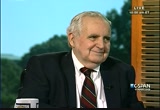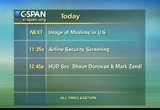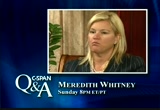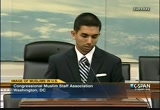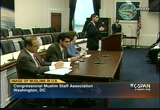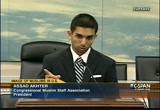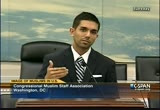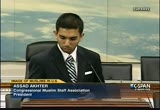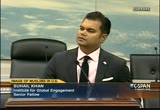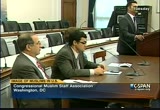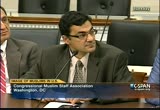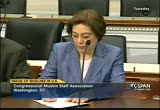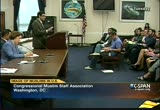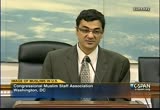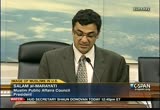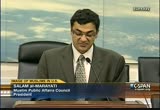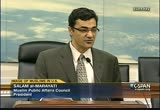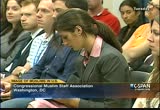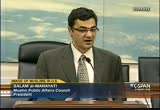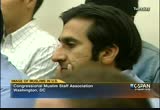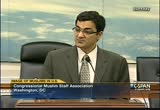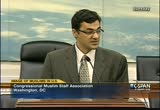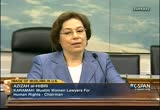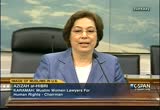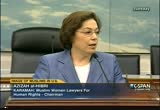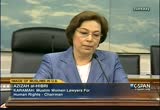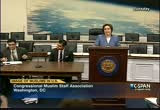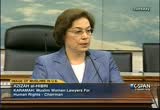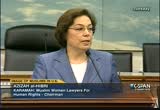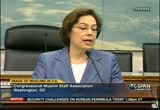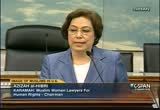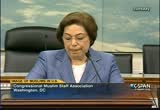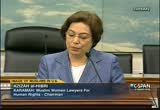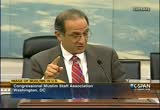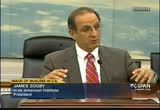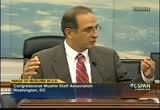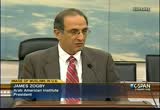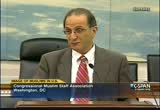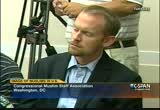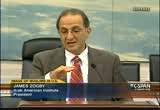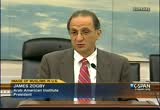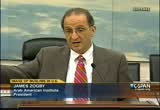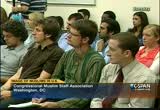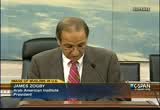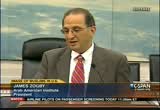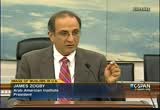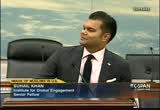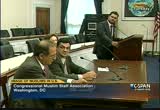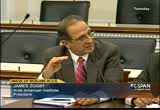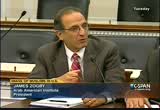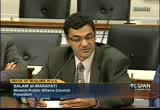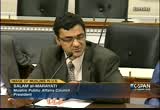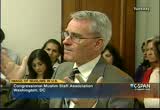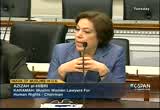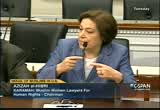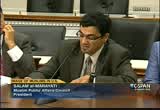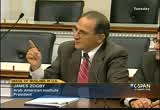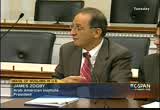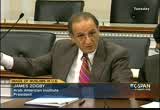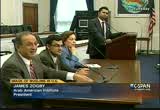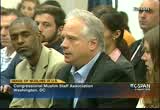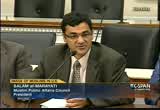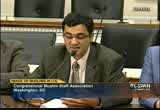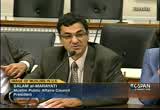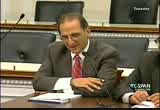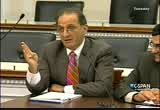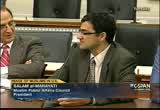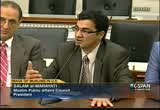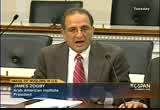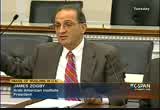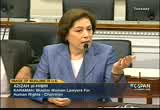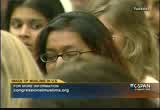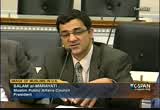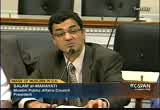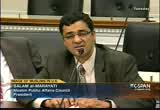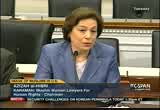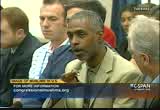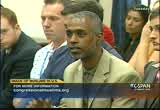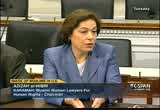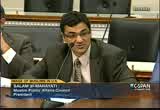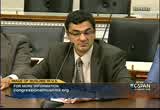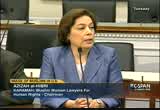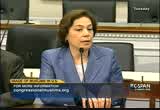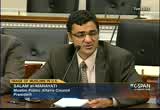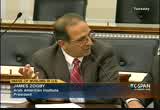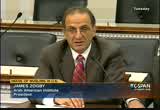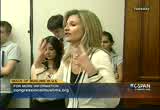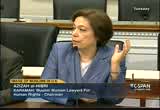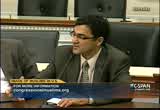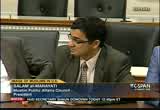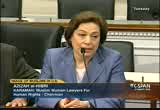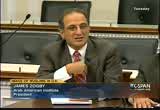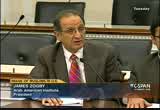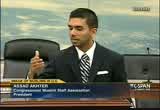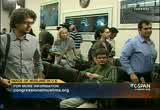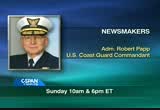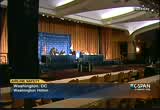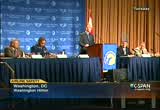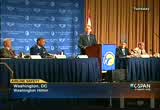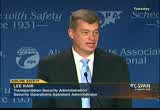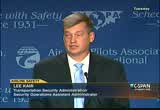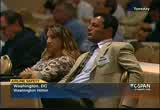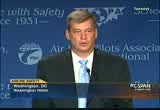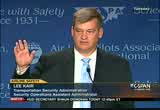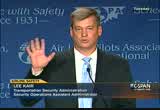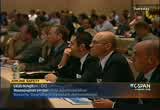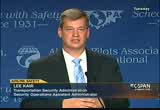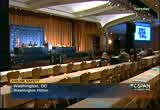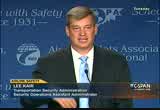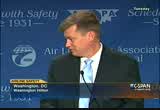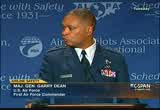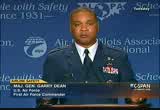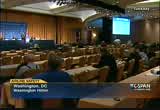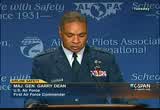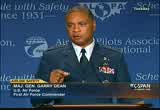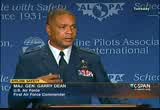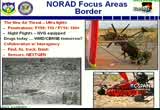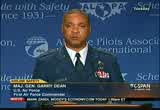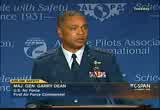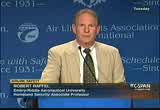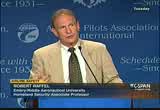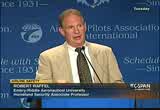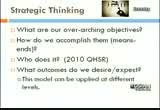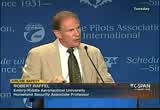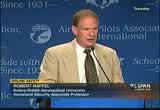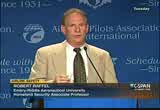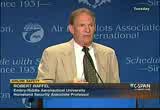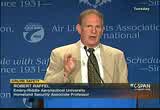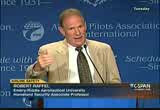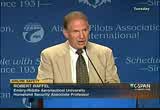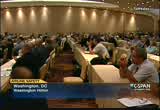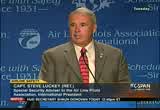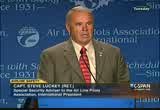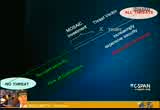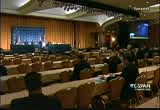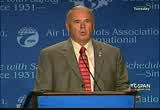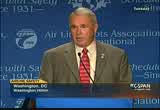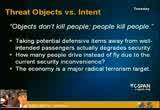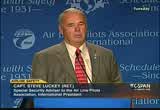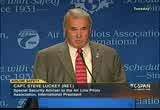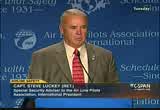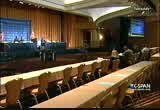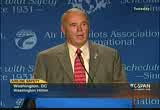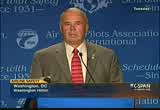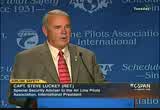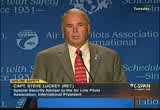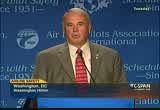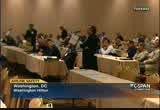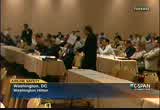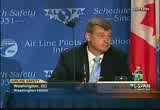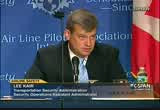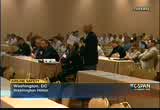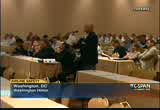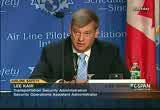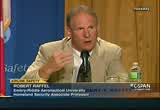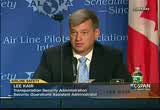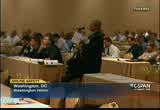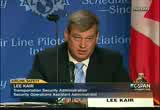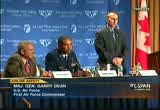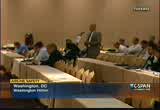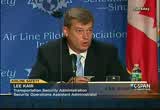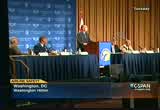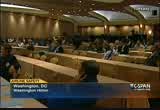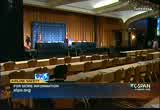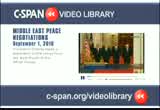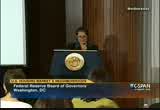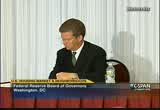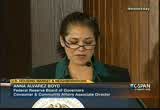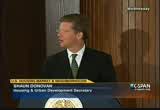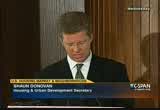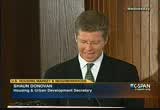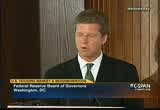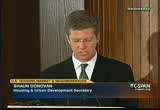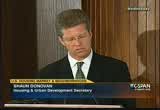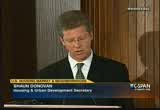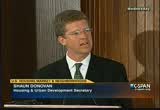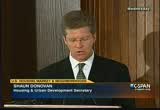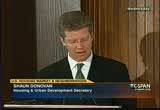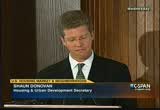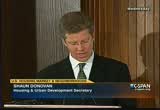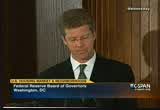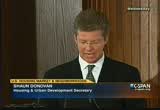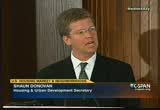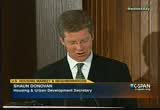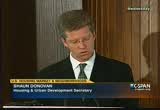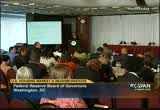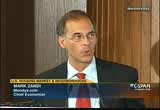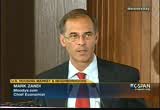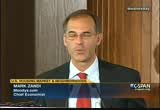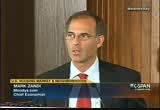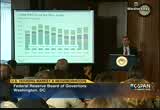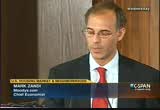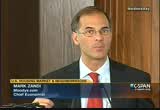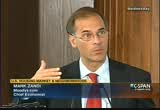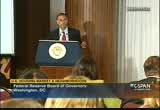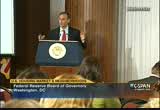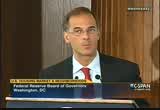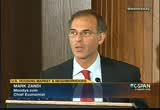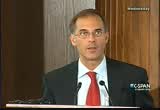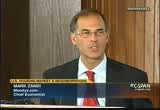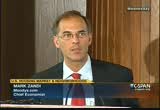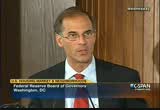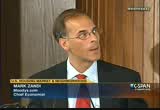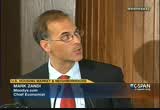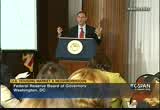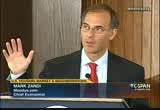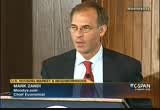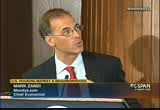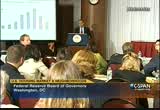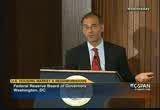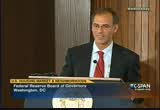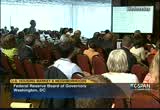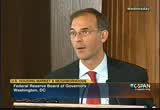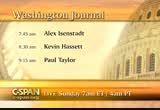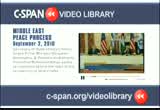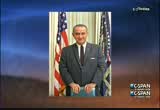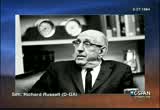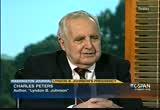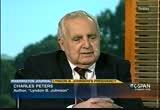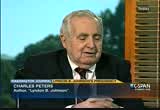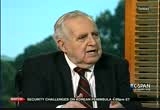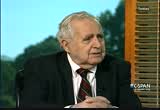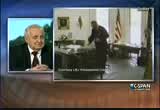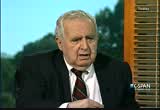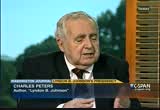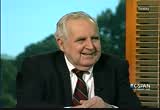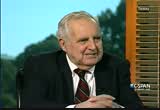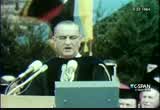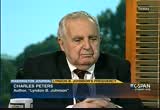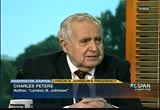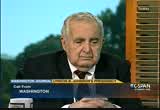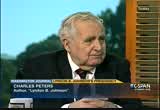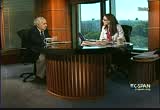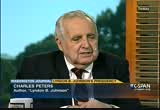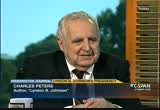tv C-SPAN Weekend CSPAN September 4, 2010 10:00am-2:00pm EDT
10:00 am
host: do you think the legacy of president johnson will become more positive. guest: i think it will. i think with afghanistan going through the anguish of figuring out what to do, will understand the tremendous difficulty of whatever we do, it's going to be wrong in some ways. we're going to do some evil, whatever we do, and that's a terrible thing to face. that was the kind of vision johnson had in vietnam. as people realize that, they'll look back on the great things johnson did. he was so much like andrew
10:01 am
jackson. we haven't talked about johnson's crudeness, but that's another fascinating story. host: i wish we had more time. guest: it was wonderful. host: this book is part of the american president series published by times books. he is director of evaluation for the peace corps during the 1960's, campaign manager for robert kennedy pickup write about your own knowledge during this period, as well. we'll be back at 7:00 eastern time, thank you for joining us. [captions copyright national cable satellite corp. 2010] >>.
10:03 am
what's in 2007, analysts meredith whitney was the first to predict major losses for citigroup. she said -- our guest tonight on c-span's q&a. >> next, a discussion on the image of muslims in the u.s.. some of the topics are the controversy over the proposed islamic center near ground zero in york city. it is an hour and half.
10:04 am
>> we welcome you to our briefing. and we have a distinguished panel year before you to talk about -- we call it a discussion. i want to be clear that this briefing is not about park 51. none of the panelists here are experts on the project or connected directly. this is not about park 51. the congressional muslim the staff association does not necessarily endorse the positions of the panelists here. we want to bring together
10:05 am
experts and community leaders to talk about conversations in the wake of this controversy that is taking place all across america. it is a complex conversation that we're having right now. the muslim staff association represents all of the muslims that work on congressional vella in all of the congressional offices -- on capitol hill and all of the congressional offices. if we screened a documentary for the capital community of the pbs documentary "the legacy of pro phet." this was in order to, can make kate information about what was happening. this is happening -- to communicate information about
10:06 am
what was happening. this is something that we can speak about directly. but we're very honored to have this panel before us to talk about this larger conversation in america. it is not simple. in a time that -- "time" magazine poll that was digging a few weeks ago, 26% favored the mosque near grand -- ground zero. but two statistics that were not in the same poll, the same people said by 55% they would favor a mosque in their own communities. and by 55% they also said yes
10:07 am
when asked if muslim americans were patriotic. our moderator today worked on capitol hill and started the friday prayer, in which every friday, muslims from all parts of the country come to the capitol dome every friday to break. we have had this for a decade. -- every friday to pray. we have had this for a decade. regardless of the adversity that we face at home, and at times it has been stifled -- stifling and there has been desecration and opposition, whatever adversity we face, there is no doubt that we are blessed to be americans and blessed to practice our faith in this country.
10:08 am
adversity is the key. we know that america from its founding, without adversity there can be no progress. i thank you all for being here today. i will not take up any more time. i want to introduce our moderator who worked on the capitol hill for many years. he is now facing your fellow at the institute for global engagement. i can say that we have bipartisan cooperation on everything we do. without any further ado, mr. suhail khan. [applause] >> thanks, everybody. thanks for coming out on this very important topic. the controversy surrounding the
10:09 am
park 51 community center in lower manhattan has sparked a national debate on a host of issues beyond just the construction of a community center in lower manhattan. a lot of folks have been asking themselves what is the role of islam in america, who are muslim americans, what are their aspirations and goals, and even the tougher questions have surfaced, including, is their relationship to terrorism and islam? there are other questions related to the role of women in islam. i have seen on the front -- things that were on the fringe on the internet and in chat rooms have bubbled up to the mainstream conversation to the point that muslims have been
10:10 am
accused of somehow being loyal as americans, that they might have inherent conflicts in their faith as far as their loyalties. they're all kinds of accusations swirling around. we have assembled a panel of experts is to take on some of these myths, challenge some of these myths and shed light on some of these issues that have come up. i will introduce the panel and they will each speak for a brief 10 to the 15 minutes and then we will go right to the q&a. before we go, i want to remind folks since we are being taped here, if we could turn off the telephones and pagers so that we do not have any interruptions, that would be helpful. our first balanced -- panelist is salam el-maryati.
10:11 am
he is the executive director of muslim public affairs council. he resides in los angeles with his wife. but he is a fixture here in public forums where he has worked with the executive branch on capitol hill. he will discuss issues -- just a basic overview of the role of muslims in the united states. next up we have professor azizah habri. she is the chair and founder of the muslim women for human rights. we have a lot of questions and myths related to sharia.
10:12 am
i would say that sharia is like when you are a kid and you learn to repeat it. -- you learn a dirty word and you want to repeat it. when i was a kid everybody was accused of being a wahabi. now the word is sharia. last up, our speaker is dr. james zogby, the founder and president of the arab-american institute, who has really been a pioneer. he has been working for over 30 years in the trenches, really trying to empower americans from all backgrounds and faiths, but predicted the early in the arab- american community. he is arab-american, but also irish, also a catholic.
10:13 am
he will provide some historical context for theflic challenges we are facing right now. >> i will be talking about the the american islam, but i will also talk about park 51. first and foremost, the nomenclature of this particular controversy, it started out as the ground 0 mosque controversy. by now, everybody acknowledges that the place is not at ground zero and is not in moscow. it is a few blocks away -- and it is not a mosque. it is a few blocks away and it is a community center that was
10:14 am
intended to develop interfaith understanding. i think that is important because a lot of muslim american institutions now are doing exactly that. they are reaching out to their fellow neighbors, to christians and jews and their local communities and developing interfaith understanding and tackling issues such as party, homelessness, any kind of injustice. -- such as poverty, homelessness and any kind of injustice. all western faiths are really rooted in the abraham as the father of these three great religions. but the fact is that it was called the ground 0 mosque and that has caused a lot of consternation. here we have to distinguish between truth and fact. the truth is it is not on ground zero. it is not in moscow. it is a community center. -- is not a mosque.
10:15 am
it is not a community center. we have to deal with these realities. moving away from this controversy, uc demonstrations against mosques and -- you can see demonstrations against mosques and muslims throughout the country. one thing you can see is in the burning of the koran day on 9/11, particularly in gainesville, fla., where a christian religious leader will sponsor the burning of the koran day. this is obviously a major issue for us, but we have told our congregations, muslim americans, keep doing the good work that the koran tells us to do. but as americans, we should be very concerned about that
10:16 am
because first and foremost, people need to understand what is in the koran. the koran is basically what muslims consider a revelation from god just as the jesus is the word of god that muslims believe in. mohammad was given this revelation that is basically compiled to date. and within the koran there are stories about abraham, a isham file and is it come about moses -- isaac and ishmael, about moses. mohammad wrote about the injustice and tyranny and how are they were liberated. motherd about jesus's mary. we take responsibility as
10:17 am
muslims in not presenting the kind of inflation to people. we have this burning of the koran data we're telling muslims, number one, ignored it, and number two, if anyone in europe aboard is burning anything, call the fire department because that is a hazard -- anyone in your neighborhood is burning anything, call the fire department because that is a fire hazard. we have images of americans burning the koran and that is propaganda and fuel for terrorists. anti- muslim sentiment in america is basically a nearer of anti-american sentiment on the global arena. as anti-muslim sentiment in
10:18 am
america and spikes, then you can expect, and anti-american sentiment spike. we have talked about how this undermines our efforts throughout the world. this issue of islamaphobia has to be viewed as american, not just in muslim problem. the 70% of the american public has a very favorable or no view on islam. here, i think the extremists are able to tell their stories and more effectively than the muslim american community can tell its story. because the muslim american story has not been told in terms of who we are, what we represent, how we want to contribute to american society.
10:19 am
yet, if some guy in some cave decides to make a video that talks about bombing innocent lives and the part in the world -- in any part of the world, if that tape is made, then within minutes, instantaneously, you get that video played over and over again in all of the u.s. markets. yeah, if we as muslim americans, which we have done a number of times and we talk about in our paper called a "building bridges" we continue to them work. we have had several condemnations of islam, even before 9/11. that story is still not told. but in the broader sense, there is a problem between religious nationalism and a religious pluralism.
10:20 am
religious nationalism, when a few, a small group of people exploit religion, using his popularity to serve the selfish goals of the few and create violence, anarchy, chaos, and they exploit religion and religion becomes something without justice. a religion without justice is then exploitation. they want, to serve them. they do not serve god. want god to serve them. they do not serve god. religious pluralism means we believe in one god, but in human equality. human equality is critical to the notion of a belief in one god. therefore, it is crucial to
10:21 am
believe in religious diversity. the koran says, do not worry about your differences, just completed the good work. this diversity is very important for muslims to understand as well as for us to explain to other people. and very briefly about sharia, it simply means the road, or the way, or the path to god. it is a general term. but one person made an important statement about sharia, well known in islamic history. he was a student and he says, "when there is no justice, there is no sharia." if we are talking about the sharia of what we see in the
10:22 am
middle east when there is bias against women, when there is oppression and violence against the week in vulnerable communities, that is not triet and that is not what we will -- that is not sure rhea and that is not what we want in america. we will be the first half to stand up against the exploitation of that kind. and another scholar says, "if there is no security, there is no islam." therefore, america, to us, is the best place for muslims and the work for the constitutional rights of all americans. thank you very much. [applause] >> good morning. i did not intend to stand before you and talk about sharia law. that could put a lot of you to sleep because i treated as a
10:23 am
bitter legal discipline. i came to talk about american muslims in the united states. if you have questions about sri lanka, more than happy to answer those -- sharia law, i am more than happy to answer those. i looked in the papers and the library of congress letters and so on and i found a lot of interesting stuff along the way. not only as far as the founding fathers, but the mood of the country in those days. and i was very surprised to find that, for example, that on the level, there were plays written about the attempt to liberate muslim women in the east. i found the there were also suspicions expressed about
10:24 am
muslims. there was an attempt to make a change by the u.s. states in north africa. there was a writing that also called the religion and the profit an imposter. this step has been happening for a while, not just yesterday. i think it is time we ask ourselves, how are we going to relate to each other, and what is the foundation of this historical misunderstanding? i do not want us [unintelligible] let's have an honest and healthy discussion. we believe in a country of laws and due process. this is about all of us. it is not just about an islamic minority or muslim minority.
10:25 am
another big shock that i developed as i was reading the history of this country, i walked along through the campus of my university to the historical baptist society and, lo and behold, i found out that their leaders in their own time suffered quite a bit. and in fact, this is not the only group that has suffered. jews, catholics, and i can name a lot of other minorities that have had difficulty getting stabilized in this country. i realized, you know, we all go through this, but hopefully, as we mature in our understanding of the constitution, the process will become more dignified and less painful. i want muslims in this country to understand, in some way, everybody else had to go through this one way or another.
10:26 am
the other thing is, thankfully, something the founding fathers introduced. a lot of the new the newsgroups were christian, and atheist and other religions. they introduced the bill of rights. for is a double request. at one, reassert, our commitment to the first amendment. -- we assert our commitment to the first amendment. i think this is one of the major attractions of the u.s. to immigrants that love their countries and they leave them because they truly believe that in this country they can have free and dignified been that
10:27 am
they have missed elsewhere. the supreme court throughout the years has, again, elaborated and amplified the basic proposal -- principles of the first amendment. for example, donnelly, chief justice rehnquist -- whatever we might feel about the person sitting next was, they have rights -- next to us. they have rights. furthermore, the legislative powers of the government can reach actions only, and not opinions. it is wonderful that we can all sit here and i'm sure some of us will disagree on certain aspects of the discussion, but we are
10:28 am
protected by the first amendment in doing that. one wonders about this a tuition -- the situation with all sorts of misinformation about islam, i would like to point out that the misinformation does not only come from non-moslems. it also comes from muslims. i feel that a major part of my responsibility in this country is to educate muslims about what the correne release says. for example, since i'm a woman and i'm committed to women's issues and liberation, that our organization we run clauses that
10:29 am
will teach women and hopefully eventually mend about -- eventually men about their rights. most of the woman that we teach our surprise about those rights. there is a very negative stereotype about islam that goes around. and it goes around even within the muslim community. they do not understand that this holy book, this koran, has basically the principles of the first amendment in it. historically, muslim communities have practiced it. it did not start in the united states. it might not have been as good, as perfect -- and it is not so perfect yet a practice in the u.s., but it was done in an
10:30 am
historical era when no one else practiced it. when islam was tolerant and used diversity to develop societies as opposed to fight progress, you know, if islam did that, how come we forgot all of these important achievements and, instead, we went to an authoritarian structure and an understanding that has caused a lot of pain. luckily for us in this country -- not only for us in this country, but elsewhere. we need a serious conversation about islam, and by that, i include the muslims. we need a conversation not based on the demagoguery for someone telling us what they think islam is, but a serious study of the
10:31 am
text of the koran that shows, for example, the heart of is time -- of islam, through the separation of powers, the collection of the head of state. none of this we see today in muslim countries. that is why it was said that this is the most congenial country to be in for his time -- islam. if we are going to talk a little bit about islamic law, i would mention one versed in the correne that is paraphrased -- in the koran and that is paraphrase by jefferson, and it says, there is no compulsive
10:32 am
religion. there is a freedom of exercise so that everyone is free to participate in what they believe in. communication -- even if somebody, the koran says, talks to you in a way that is hostile , return the bad deed with a good one so that ultimately come , this person who is hostile to you will one day become your friend. if they understand that you are not out there to hurt them and you are friendly, then they will come around and talk to you. i would like to see serious conversations started in this country. the words fisher real loss have
10:33 am
been invented around -- sharia law have been invented around a threat. i do not understand this. maybe you can in-line need during the q&a and i would be happy to answer, but -- you can enlightened meet during the q&a and i would be happy to answer, but muslims have been coming to this country, since the 1600's. a lot of people think that muslims are recent immigrants to this country and that is not true. i would like to read you a chapter, chapter 14 verses 24 and 25. it says, "a good the word is like a good the tree, whose roots are firmly fixed and its branches reach to have been. let's all strive for the good word."
10:34 am
thank you. [applause] >> good morning. my daughter, mary margaret, used to tease me about 10 years ago when i was 55, she would say, it must be fun being 55, you get to meet new people every day. it was an expression she started using because she introduced me to our friend one day and a couple of days later her friend was over and she said, you have met my friend and i said, i do not think so. and she said, yeah, dad, it was two days ago. it seems we have to start talking again about what is this all about and who are these people and what is this religion all about.
10:35 am
at some point it will begin to dawn on us that there is something we need to know and we have to pay attention to it, but let's do it one more time. shortly after the september 11, i was invited by bill clinton to be on a panel like what we are doing today. americans were in shock, people in new york in particular, and had a lot of questions. we recognized the importance of dealing with that, if so what we did was begin to talk about what -- who muslim americans were. what i did before when to the session is i call a lot of friends to get anecdotes. i have been doing this work for 30 years and i have an ad -- a doctorate in islamic studies and for as long as i can remember i have been pulling arab-
10:36 am
americans and american muslims. there was a young woman who told me one day, not point to be like my father. i want to practice my religion by opening a clinic for the port. that would be how i practiced my faith. or.a clinic for the por that would be how i practice my faith. and there was a guy who toward me around a mosque and showed me how he got this from syria and that donated from lebanon and yet all of these wonderful or fax. it reminded me of my father and my uncle who built a church in utica, which is going to be celebrating the 100-year anniversary of the parish. and since then, the pride in
10:37 am
building and establishing their institutions in the new world, and that man died a few years later. two years later, i was able to help his son get an internship in washington. he said, if only my dad could see me now. he would be so proud. this is why he came to this country. there're other stories. in dearborn, in the middle of ramadan there was a fight in school because it had started that -- because there was a student who wanted to go to study hall during lunch and the teacher had told him know. during the lunch students were throwing hams at the student. it obviously provoke a fight.
10:38 am
this 14-year-old girl told me, i have a solution and i went to the principal and told him, the problem is, they do not understand our culture. maybe you could help us understand -- to help us make them understand. he snapped at her and said, my job is not to promote your culture. you need to understand ours. there were still many other stories of people that reminded me of my background and i'm sure the background of some of you here. people who were americans who have pride in their faith and heritage, who share the american dream and value of the values of america.
10:39 am
it is an american story. it is a community not unlike other communities. and it is interesting because the anecdotes tell that story, but our polling does as well. we have cold not only arab and muslim americans, but irish and italian and polish. if we get a book a few years? called "ethnic americans, what they really think." what we learned was quite fascinating. first, the diversity was extraordinary. pro believe the single largest group was african-american -- probably the single largest group was african-american. but after that there were others. you have folks from other countries who, again, each one of them as you meet them remind you of the immigrant story of every other group that has come to america in terms of their values, in terms of their exact
10:40 am
-- their aspirations. you have a guy who has a day job and a night job and three kids and they will tell you about them. it is the american story. the values of muslims in closely the values of other americans, in particular catholic. white muslims lean progressive on a number of issues, like health care or the social security position, or school funding or the environment, but they've been conservative on social issues, like family values, or abortion, or tough on laws that would fight terrorism. the income of muslim americans
10:41 am
is slightly higher than the national average. and mosque attendance is actually about the same as church attendance. and the value of those that are regular attendees track closely with those that are regular church attendees and with those that are not. the american dream is the same. this is what we know and this is the story that we told after 9/11 and this is the story again today. president bush got it completely right. the problem is not islam. the problem are people who have used islam to commit violent acts against our country and our people. but what happened after 9/11 when we were all asking these questions is a cottage industry of those who actually had an ax
10:42 am
to grind against the religion of islam, and against arabs in particular, they ended up providing most of the answers. they wrote books and got them published. they testified before congress and dominated the airwaves on radio and television. i will never forget a hearing held in the senate on islam featuring three guys -- actually, if you had the reverse and three muslims were testifying on the nature of judaism in an arab country, you would hear yells. but this was acceptable. the allies that they told of the bigotry that they spread was horrific. but that is all people heard. that is all they were in a position to hear. these guys related every incident of violence as somehow evidence that they were right. they have done enormous damage.
10:43 am
shortly after 9/11 when we pulled all of america, people still have a favorable attitude toward islam. today when polls, they do not. back then, three-quarters of americans said they felt they needed to know more and wanted to know more about islam and muslims. today, less than half say they need to know more. that information has increased as well, so that people think they know. that is the dangerous thing. ignorance and certitude is probably the most dangerous combination of all. you talk about sharia -- and we went into iraq not even having a clue and a month later, people were talking about sharia and
10:44 am
wahabi and if you had two words to say about it, you were treated like an expert. they actually organized politically. they were the one that -- they are the ones that are still organizing against park 51. it is a danger to the image of our country abroad. it flies in the face of the wise counsel offered by george of the bush. it is a danger to our values -- george w. bush. it is a danger to our values, also to we are as a country. a few years back i was invited to speak in warsaw and prague and other places in europe to talk about the difference. people wanted to know the difference between america and europe and y arts your muslim and of -- why are your muslim
10:45 am
and arab communities not alienated? i began and i spoke about the fact that we, as a nation, have always been different. we have been different in the sense that america, as a concept, is different and america, as a royalty is different. no one group defined too weak -- a america, as a reality, is different. no one group defines who we are. you do not just get a passport here. you get an identity as a new person. it is an alchemy that transforms you into becoming american. you could be incurred in germany for three generations and you will always -- you could be a kmurd in germany for three generations and you will always be a turkey. you could be pakistani in
10:46 am
london and you will also be packed -- always be pakistani. you can get citizenship, but you never get the nationality. you do not get that sense that you are part of these people. the narrative does not include you. when washington crossed the delaware, i was on the boat. it was a sense that it was your story, not somebody else's story. that is who we are as a country and what troubles me is that what is at stake in this park 51 story is not about a building and is not about a place. it is about the narrative of who we are as a people. and if these guys win, whatever the outcome, but if these guys win, then america will not be america anymore. and the story of the muslim community here may very well be like that of the muslim community in france or germany,
10:47 am
and that would be devastating for the social fabric of our country. i will leave here and i thank you, and i hope to have this discussion in another way. thank you. [applause] >> thank you, dr. zogby. i know we have questions. renewables first -- make sure it is a question and not a speech -- ground rules first. make sure it is a question and not a speech. if you want to make a speech, have your own panel. [laughter] we have microphones here and they will come around and make sure you are heard. let me pick up on what dr. zogby talked about. i have been talking to some friends in the media and post 9/11 we suffered this horrendous
10:48 am
attack and -- but, the country seemed to pull together. why is this coming up now, eight, nine years later? why is there now a call to stop the construction of mosques around the country? there are 2000 + mosques and around the country. the population has grown to nearly a million muslims in the country. why is this coming up now? >> there is a general mood afoot in the country. it is part and parcel of the broader social unraveling, i think, that is taking place. we saw it began last summer. i think some of it has to do with the fact that we have
10:49 am
elected and african american president. some folks just cannot in just it. there is no question that the economic distress and social dislocation is part of it. and i think at the same time, eight or nine years of disinformation has taken a toll. but the social conditions were not there, if this unraveling was not there, i do not think we would see it in exactly the same way. it is classic xenophobic nativism. we have seen it in our history before. we have the anti- asian backlash in the early part of the last century. between the two world wars we had an anti-southern european. italians got lynched and there was a push to deny immigration.
10:50 am
we had the same kind of thing. and we have the anti-german wave as well. in times like this with the economic distress that begins to happen, i think it has been fueled by ignorance, but another factor is that the president himself is in a bind. george bush was able to come and speak out. if barack obama comes and speaks as forcefully, you've got 20% of the public that thinks he is muslim already and hold that against him. it puts the rest of the country in a bind in that, where does leadership come from on this? i think it is a terrible situation and we knew -- we do need political leadership. instead of fanning the flames,
10:51 am
as some are doing, we need political leadership to do the right thing and put this out. the very social fabric of the country is at stake. >> i agree with everything jim said and i think we are at a crossroads in our society in terms of how we define america. is america an exclusive club, art -- or are we going to live up to our values of pluralism? when people start questioning the koreshan ready of the president, i think that is a form of nationalism -- questioning the christianity of the president might think that is a form of nationalism. they're using that to say that america is an exclusive club. the fact is, most americans are
10:52 am
the easiest targets. they are -- muslim americans are the easiest targets. we do not have a reach. we do not have a lobby. we do not have a pr infrastructure. while we are responding to everything, the other side, obviously has the microphone. my mentor has always said something that is very telling for us as muslims, for us as americans, for us as people. he said, the world is not divided into muslims, christians, and jews. the world is divided into stupid people and intelligent people. >> on that note, the ones to be the first to ask a question -- who wants to be the first to ask a question? [laughter] >> sahauil, you and i have
10:53 am
discussed this in the past, and while most americans endorse an embrace our values and 20 good americans, unfortunately, there are those that do not. and they are professing to practice islam. there is no central authority, no definition of what a good muslim is. is there an effort within the muslim community to uphold an america confirming islam and reject and marginalize those people who want to kidnap islam? >> i think this call in american myth -- american islam to tell people that is misguided. we do not have a pope.
10:54 am
we believe in democracy. we believe in structures. even outside of islam, you can have an interpretation of islam, as long as it is along with the koran. people who have studied islam, who can study it and think about it and ride a about it can come together and comment in writing. that is why i was calling for an education. for example, recently, a lot of people came to me and said, what about this story of the starting in afghanistan? isn't that applying to sharia law? and i said, oh, my god, if that
10:55 am
is applying fisher real law -- sharia law. we sat down and we wrote about how that is not sharia law and secondly, they killed innocent victims. hi, as a woman who believes in away from, will move a central authority, but will ask for legal authority in the sense of understanding religion and to educate muslims as well as non- muslims in the u.s. >> it is not just what scholars are saying the, but also what people are doing on the ground. the strongest for line against any kind of alienation, isolation of young muslim americans, the work is being done in the mosques, in use associations, community centers. is people that promote civic
10:56 am
engagement. for example, there is no stoning in the koran. yes, that myth continues to be repeated that we have to respond to over and over again. as far as sharia, as we said, is the got to god and the principles are mercy, justice, and a human dignity. the goals of sharia are accepted by all these colors with unanimity. they are the right to life, free expression, faith, family, and property. if there is any violation of these goals, then it is a violation of the sharia. that understanding within the common muslim is the goal that our organization and other organizations are pursuing. >> jim? >> let me take another cut at that in a different way.
10:57 am
i am a catholic. all priests are not pedophiles. i work with the italians. they are not all tied in with the mob. i am married to an irish woman. she does not drink. [laughter] i remember saying after the christmas day attempt to bomb the plane in detroit that we learned from that that we did not connect the dots in our intelligence community correctly. as dangerous as of not correcting the dots is to wrongly connect the dots and think you have come up with a picture. one of the problems is that they have inflated every incident that have occurred and drawn a portrait of islam.
10:58 am
some have chastised me for using the word of bigotry. -- the word of bigotry. but let's understand what that is. bigotry is when you take the characteristics of a few and generalize them into the behavior -- or attribute that into the hole. -- priest, that priest unfortunately, the only stories that we read about priests today are that. but there are good, hard-working muslims all wrote -- all over and we know in our heart of hearts the experiences. the problem is, we do not know muslims well enough yet. we need more intelligent conversation. we need more exposure. we need to know more about it. we need to retain what we know. and we need to not connect the dots in a way that is not warranted. i think, more than a religious
10:59 am
authority there is more experience and a change of heart. that would be helpful in dealing with this problem more than if you had the muslim pope say, he is not a muslim for what he did. we would still have people saying the opposite. i remember in new york on the first anniversary of 9/11, tom brokaw invited me to speak in the round to families of survival -- survivors. it was a painful and difficult day for them and for me. first, they ask, what would justify it? and i said, nothing justified it. next question, why did you say nothing justified it and then say "but?" i said, nothing justified it.
11:00 am
i understand their pain, but for the rest of america, we did not have that direct pain, but yet, too many still closed barriers and said, all muslims -- many still closed their ears and said kamal muslims feel this way or that way and when they spoke out, nobody heard them. >> keep that in mind. >> what do you think of the
11:01 am
positive light and islamophobia? what i have found out is if there is interfaith multi- cultural peace movements not just in northern virginia and washington, d.c., but they are in israel, palestine, jerusalem, no mention of these organizations, why do think that is so? i am jewish but i'm not a billionaire. if you look at the press, all jewish people are all rich. this stereotype goes on with african-americans and lots of different minorities. how do we change these images so that america changes as the images change? >> two points on that. i wanted to speak to two issues.
11:02 am
first, the nature of the media is the only cover conflict. moderation and bridge building is not newsworthy. it does not make the news when we get 10,000 people live in chicago at our annual convention. we bring government and all sorts of civic leaders and we talk about how we, as americans, from all different faith backgrounds are working together for justice, are working together against a the kind of extremism. we're working together for peace and security for people in the middle east. it just does not make news. unless there is a conflict, and if you look at the stories about muslims, it is usually about their religious holiday. where there is a discrimination
11:03 am
story about a woman who wears a head scarf or a man who wants to have his beer. -- beard. when it comes to the head scarf, i know it has become very politicized and now it is becoming politicized here in america. the head scarf has become a political football. a woman who decides to where the headscarf, it is her choice. when it comes to the head scarf, we should not be imposing on women how to dress and we should not be telling them they need to take it off. we should be pro-choice on that issue. the other issue of discrimination, and looks like muslims are concerned about entitlement. the second problem for us, as muslims, what is our responsibility? i do not think we have effectively answered the question that our fellow
11:04 am
americans have had. we tend to talk about worship. they want to know what our social interaction is and what our role is. in 1988, we had about 100 people, muslims, christians, arabs, and non-arabs go to the democratic national convention. we felt that we were part of that american experience. we felt we were contributing in the terms of the policy discussion, in terms of our interaction. now, we find less people attending the convention within the muslim american community. there needs to be more civic engagement. but i think for stores could be told in the most american community. it is not about the scholars but the mainstream voice. what is the mainstream voice? we still have not understood that.
11:05 am
>> next question. >> you spoke a lot about -- >> begin to the microphone. >> you spoke about information in the mainstream and people who spread hate. i was wondering if you could give names of organizations we should be aware of in the media. >> i think we can talk later. the websites are now. they have been tormenting many of us for years. i had the great honor of speaking at the 45th anniversary of the signing of the civil rights bill and i was invited to give closing remarks. the next day an article hezbollah"holder's buddy."
11:06 am
a few weeks later i was invited to speak at the pentagon. it was sponsored by the muslims in the military. if you days later, an article appeared -- to be hezbollah and [unintelligible] it's really a rough game. they are all over the place. what troubled me is not only their website which taught college professors and urged students to spy on them and create disinformation campaigns but not just about muslims but arab-american leadership's. what troubles me is the degree to which they end up dominating fox news, msn b.c., and cnn money comes time to talk about these issues. we do not get the air time to talk about them. they do.
11:07 am
if we get invited, we are invited to debate them. frankly, i do not want to engage in a debate with these guys. it does become a bit of a problem. i think where the media has a responsibility is to look up their rolodex is and be more responsible. >> it is not just we are invited to go to debate them but we are invited to deny the accusation. the cards are stacked against us. then you just look like you are in denial and goes back to the media. how come the message is not going out? anytime you are invited to say that we are not terrorists are extremists, that is all people think about. that is one thing. we were also called -- we do not lobby. we are here to educate people
11:08 am
about who we are and what we represent. second, our organization from its beginning, has stated clearly that we did not accept any foreign funding, not because it is an issue of legality but because we decided we wanted to stress the muslim american identity. we wanted to be financially and philosophically independent from the middle east. yet, someone continues to call as part of the lobby. we did not subscribe to that thinking. it gets repeated enough times that it is the lifting of people's minds. -- it is the only thing on their mind. >> i got my doctorate in religion. i did my post-doctoral work in our religion is used in societies under stress. remember george carlin had a routine where he talked about
11:09 am
words and how they were used? it was an interesting lesson because it was a lesson on how the meeting of the word is how it is used in the sentence. is the same about her religion is used, too. the language of islam used by both this cast of characters we're talking about but also -- but also by the terrorists are identical in that they are using language because of its evocative content. the guy who gets up on the plains -- plane and says "allah" or whatever. he's making a statement saying he really hates us, he is upset, he is mad at his father. we could psychoanalyze, but similarly the guys who throw these words around, i remember on the playground guys would call me names. the name they choose to call is the name that has the most evocative reference. there was a time when i may have
11:10 am
been called a marxist socialist communist. nom -- now i am called a hezbollah. it is a way of taunting because the work has a pocket of content. if someone says, "jesus christ," there are not making a statement of faith. they are saying they are angry. we need to understand the use and abuse of language in this context and understand these guys to run these names around, the truth the value of this means nothing. they are not concerned with them. in look in the dictionary and wonder what the worst word they could use right now. this will work if i called him this. >> let me say again that there is nothing new about this really. i make new friends and get new arguments every day.
11:11 am
the media might take control and influence thinking of the community so that it would have more power than it should in a democracy. this is a problem that america has that it needs to solve not only with respect to muslims but with respect to the media in general. as for the muslims, my approach is that instead of complaining about it, which we have done enough of that, let's look for a solution. a solution for me is that there are a lot of most of doctors, business people in this country, but they shrink away from being lawyers, reporters and so on. another is a generation of young muslim lawyers that i am very happy to see around the country. where the communication people? if you want your own voice to be heard, where are you? if you are sitting at the paper
11:12 am
and someone here is your objection to the news they are about to publish, maybe you will be able to modify the view. my approach is, okay, we know the problem. let's move in and do our part in correcting it. >> we have a question right here. >> you have referred to the media appeal of interfaith about -- interfaith worth. it is almost solidified in the lessons of the opinion and the viewer. what can we do when we cannot sell moderation, sell our identity? what are we supposed to do? >> first, we believe that when it refers to hate, it's as the rhetoric of hate is like these
11:13 am
come on top of water that will flow away. the good work that you do that is of sustenance will remain on the earth. that will benefit humanity. it tells you, first come ignore the rhetoric and the noise. it will always happen. it has been happening since the beginning and it continues to this day. even though the good work is not sensational, even though, the relationships we are building is not creating energy. it is creating a movement for change. the people that we get to go -- get to know, rev. bacon, these are great people. jeremy from jay street. these are great americans. the stories, these people
11:14 am
working for peace and justice will prevail eventually. in terms of being more media savvy, what we have, for example, we have a public- service announcement that went out onto the internet and got a lot of play. it got into the media. it was called in the justice cannot defeat in justice. it was a group of muslim scholars talking to young people and telling them not to be fooled by the rhetoric. those efforts are getting significant media coverage, but as we know in any immediate it is only within people's memory in a short span. next week as a whole new story. you have to rethink telling that story over and over again. we will be doing some 9/11 service activities for example. there will be the health clinics on the day of 9/11.
11:15 am
it will be a commemoration and it is a shame that part of the industry is trying to divide the victims of 9/11. we were not victimized by the people of all ethnicities, of all backgrounds work in the world trade center towers. we were all attacked as americans. telling that story is important. we will be having a commemoration and a vigil on that day. it will get some coverage, but you will have to continue working it. the third thing is now that we have social media, we are creating our own movement in the sense that word is getting dr. facebook and twitter and other means of social media. that will get the interest of the networks at some point. i think there is much hope. we have a lot of opportunity in getting the word out. >> not all of the ways in which
11:16 am
you respond to the situation, some of this has to be really hard to work overtime. that is the work of scholars. when you tell scholars that muslim says "x," you have to prove it. we have to be prepared. these articles, you cannot bring them out of thin air. do have to take the time to study and analyze. it sounds very academic, but believe it or not, i was in one country where they had a law which i thought was unfair to women. i was are giving the needed to change it. the legislature look at me and after i expressed my point, they asked for the footnotes. grass-roots work is very important.
11:17 am
>> i would like to say i'm grateful for this conversation. i am proud to be a muslim. i am proud to be an african- american, as you can probably tell. i am also a veteran as well as a health care and disabilities attorney. it always surprises me. do you think that maybe we can change the narrative by making sure that our spokespeople are also representative of the full diversity of the muslim community? there are many other african americans, even latino and european americans who, as you know, are the most increasing population of muslims in this country who are more than committed to being involved in this conversation. that is my first question. my second question is, do you not believe that we should take the history note from the
11:18 am
african-american experience in particular and when we have the reconstruction, after the civil war there was a rise in african- american -- anti-african american sentiment and resulted in lynching in all types of formal actions across the country. do we not see the same parallel? all attention was on arizona and the immigration law to demonize the team knows. not so long ago -- to demonize latinos. do we not think some of the group's funding things as you read in the "new yorker" magazine -- >> we have the question. >> let me just your terminology a little bit.
11:19 am
we we see it and teach in my organization is that it is a continuity from the early days. a lot of these americans are muslims. we believe the american muslims from the 16th century and later had helped build this country. we are not new immigrants. if you speak about immigrants, you are forgetting the other wing of muslims who have been here. not only do we see a continuity, but the experience to arm referring to is our experience. the question was how much in the community to identify with each other? how do we do with diversity within the muslim community? that has become more conscious question recently. >> could i discuss one point in terms of diversity? the more we stress the muslim american identity, the more we will naturally have diversity in our representation.
11:20 am
yes, i agree that we could do more in terms of having that diversity there are problems you're dealing with internally where are we in the terms of civil rights progression? i think we are still in the very early stages of that. we are not, at the time of martin luther king, for all muslim americans. they can contribute positively to see where we can contribute positively to getting our rights in american society. the as a muslim american community, we are still in the stages of the divvy e. b. dubois. we are still defining "home" by now where our ancestors came
11:21 am
from, by where my ancestors lived, but where my grandchildren will be raised. that in terms of the most american identity no matter what background wherefrom is very important. lastly, god wants us all to be the thinking leaders, not blind followers. i think that is a message. it is very important we need to stress that for the thinking with them, the, muscle. >> 10 minutes. i will ask for quick questions and quicker answers. i will go right here and then i will go back and forth. >> thank you. i was interested -- i guess i have two questions. first, what contemporary muslim country of which operates under sharia for a two-point to as an example of the region of what you have said today? out when itps spoke
11:22 am
was found out that muslims were talking about murdering christians and jews stocks which were the specific people or the specific moderate muslims who spoke out against that when the international commission on religious freedom reported that? >> i would like to answer the first question. it is very simple. our belief is that -- one good reason is because the very basics of the society including the election of the head of state budget in by the people is not taking place. i am not standing here to defend any moslem country. i hope within the united states can be in some of these other
11:23 am
countries. you called this the nine -- benign. i do not like that terminology. our laws are humanitarian and equal. there's no way to make them more or less benign. the only issue is if they are applied or not applied. they are using this to oppress their people. they are trying to tell the people there laws are our divine will. we need to tell people it is not true. >> condemnation this? >> it goes back to the question. do you want to validate the accusation that muslims do not speak out? we have spoken out in every instance.
11:24 am
we do not even know the cases that come up, whether they are valid or not. the commission that the gentleman refers to, some of the leaders have a questionable views in terms of religious freedom of muslims in america. i did not want to get into the politics of the commission or that academy. when it comes to any one saying we should be murdering christians and jews we condemn that and we've denounce any groups to spot those beliefs. >> this is one of those, if i can quote the new testament, those who have eyes to see and ears to hear stories. i condemn that i am not muslim. i run the arab-american institute. i was on "crossfire" when that
11:25 am
came out. i said it was gross, despicable, and wrong. a couple years later, i was invited to saudi arabia by the u.s. ambassador at the time. they have not been able to have a visitor to the country in a long time. they wanted me to come and do a luncheon at the embassy and invite a number of saudi business leaders. one groupie invited was a group that involved a lot of young muslim leaders in saudi arabia. the ambassador took me to the event, sat with me at the event. i was introduced. i spoke. then they drove back to the embassy. i got a question about pat robertson and some other u.s. preachers preaching hate about islam. i said i condemn it. we work hard every day to fight these guys. we are working harder than you
11:26 am
can imagine to deal with the bigotry in america. i said, "but, let me remind you do have people in this country who are saying things about jews and christians that are deplorable. are you fighting them"? they all nodded guiltily. then we had a conversation about it. a week later i get back to the country and when these characters i mentioned a moment ago writes an article about me speaking at the conference. did not know the ambassador invited me or did not know i had said. i challenge them on the article about the bigotry. the point is that a lot of groups condemned it when it was first released. they did a job of getting rid of the book that should not have been there. pay attention to what is done, what is said, and i think we do
11:27 am
a lot better in this conversation if we did just that. >> question over here. [unintelligible] >> it feels like we need to add a word before we say muslim in this country. i want your input on this. unless you are not wearing a head scarf or you go to the mosque that often, then you are a moderate muslim. if you go to the mosque and you are a practice muslim, then you do not apply for that term. we see some people in leadership positions advocating those are the people that we need to talk to regardless and they are non- practicing muslims or not cool
11:28 am
looking muslims. >> i would like to approach this label and modern muslim in another way. i know my colleagues will address their answer more to the point. in islam, there is nothing wrong with saying that someone has interpreted it islam in accordance with the society they live in. it is a required efforts when they live in a society, whether it is american and european, iraqi, or whenever the did look into the circumstances of their society and then explain the rules and the basic principles do not change. the rules and secondary laws in light of that society so that when they are used and applied, it causes positive results and not negative ones. the general rule in islam is that the lawmaker made these laws in the public interest and not against the public interest.
11:29 am
yes, there are some here looking at the american society who are trying to understand islamic laws within the context of our society. there is a very traditional and accepted approach for what we do. what you were talking about is something more political. i will let the others after that. >> first of all, the qaran says you should be a community of the middle way. the profit also warned against any kind of extremism, to the left or to the right. within our religion, we promote moderate, progressive thinking. and is the responsibility of muslims to apply that in a better time and place they've lived in. i agree that the term "moderate muslim"has been politicized so
11:30 am
that now that it means it is someone who agrees with the status quo. islam is evil and that is the moderate muslim. the only people who are the moderate spokespeople are a paradox. it is ridiculous that these are the people who are now the moderates. she gives book tours and speaks ever read that she is not a muslim. or people who support policies of certain industries if you support the war, you are a moderate. if you support the policies of the state of israel, you are a moderate. because the term has been politicized and exploited, the term moderate now does not really mean anything in our community. i agree with you that it is a muslim or mainstream muslim. to be a muslim, it means you at your to the principles of islam. to promote terrorism means you are a criminal.
11:31 am
it is not a question if you are a muslim or not. >> along with an increase, which should be expect from our elected officials? >> they should stick to the values of the constitution to create harmony among the people to protect their rights. >> they should be responsible. the park 51 dispute, to the degree that it was a manhattan fight, we have seen it before over at the academy of which was a terrible loss that the school that gutted the way it did. nevertheless, it was the same cast of characters playing this out. some national political figures
11:32 am
got into the mix and decided to exploit it. one by one, it was becoming an issue. we had candidates in states where there were no muslims being asked what their position was on the moscow. -- on the mosques. they are defaming hallowed ground or whatever. it had nothing to do with states and the cities, or congressional districts around. what should have happened on the part of media and on the part of higher political ship is that we should have called about early on. we either dr. 9/11 is that the measure of our patriotism with the degree to which we are true to the values of our country and it became a cliche, but we were
11:33 am
not going to let the terrorists win. i'm reading the signs from the marches in new york and i'm listening to the rhetoric i'm hearing on these radio shows. i'm listening to what some of these political leaders including what presidential aspirants are saying. the terrorists one. they are winning this fight. we're sounding in our country know better than extremists abroad. the crowd on both sides are driving this debate. it is irresponsible. it is a shame. george bush was right. it is hurting our country, our image abroad, and it is hurting our social fabric. >> i would agree of the short sentence which was not agreeing with muslims. i would like politicians but the interest of the country at a political interests. that will serve us quite a lot. >> on that note, that had to be the last question.
11:34 am
we are out of time. >> thank you all for being here. we always run out of time in these discussions. with our panelists speaking, only in america. we have a public hearing room and anyone can walk in. you did not need an appointment and you can just walk around. we are on c-span having a discussion about a c-span is dedicated to public discussion for the american people. we are all blessed to have this discussion and hope to have many more in the future. let me think our panelists -- thank our panelists. that me introduce some of the executive board. we have our vice-president, our communications director on the senate side, and our programs coordinator. i want to think the house
11:35 am
11:36 am
quacks' up next, and look at airlines say the screening technology. then a discussion on the u.s. housing market with shawn donovan and mark zandi. sunday, commandant of the u.s. coastguard talks about the impact of the gulf of mexico oil spill and the budget challenges of the coast guard. that is at 6:00 p.m. eastern on c-span. >> the c-span network provide coverage of politics, public affairs, nonfiction books, and american history. and it's all available on television, radio, on line, and on social media networking sites. final content any time to the c- span video library. -- she's been on the road with our digital boss. we bring our resources to your community. is washington your way -- the c- span network. now available in more than 100 million homes.
11:37 am
created by cable, provided as a public service. >> airline safety security technologies and other issues were some topics discussed during an airline pilots association conference. this is one hour and 10 minutes. >> stop talking. >> welcome back. i hope you enjoy the watch. what a great awards ceremony. a delightful time to celebrate the achievements of some of our volunteers. we continue this afternoon by listening to the activities of one of our busiest committees, the national security committee. this panel brings together government, industry, and subject matter experts to discuss the advantages of this
11:38 am
-- and disadvantages of implementing technology and human technique to airport security screening. our moderator for this panel, capt. ron howers from washington state. he is the chair of the committee. please welcome him. [applause] >> welcome to the panel. today, we will discuss the role of technology and behavior analysis and their place in the aviation security system. i am captain robert powers. shortly after the christmas day bombing of northwest flight 253, we developed a white paper that
11:39 am
proposes a fundamental shift in today's screening philosophy. we envisioned a system that focuses more on the human element and less on objects. with us today to discuss this is the gsa assistant administrator for the office of security operations. major general garry dean, robert raffel from emery-little university, and a renowned
11:40 am
security export. -- expert. mr. kair. >> good afternoon. i am from the office of security operations at the tsa. i will talk about the tsa overall and about what is going on at the screening check point. so dvd obligatory mission statement. our mission is to deter, detect, and prevent hostile attacks against american of, to ensure the freedom of movement for people and commerce. it is much larger than simply removing prohibited items at a checkpoint. when you look at the operational capabilities of the tsa, it is much larger than screening people and their property and check the baggage. that is what we're most known for.
11:41 am
and is what the most of our money goes to work, the officers on the front line of the checkpoint. we also have a regulatory role. it goes from pre-tsa days when faa.re a function of hthe we have an important role to ensure that the airport authority, the air carriers, and now as we move into other modes of transportation, that we have inspectors that are responsible for ensuring compliance with the rules and regulations we have out there. another operational capability we have is behavior detection which i think is referenced in the paper. our program as a little different than many of the others because behavior detection has been around for some time. ours is really focused on a non- law enforcement person using a scientifically based program to identify those that have hostile
11:42 am
intent using scientifically validated behaviors. it is really a very unique program. insurers that we are not profiling people. we really are looking for suspicious behaviors and of looking for intent. it is a capability that we use in multiple modes of transportation. you can use it outside of the checkpoint. it is a program that has been very successful for us. we also have flight coverage. we also have an explosives expert. here in the front row, we have the chief of our explosives division. we are very proud of the capability we have there. the program is designed to train our officers. 90% of the time, they are coming up with a very innovative objects regularly, but also to
11:43 am
be subject matter experts say that whenever officer see something out there to have someone to turn to that has years of experience with explosives and can help resolve things without having to evacuate an entire terminal. we're getting better and better at incident management. we have an operations center here in northern virginia. we have a great picture overall in the country of what is going on in all modes of transportation from a security standpoint. we handle things locally so that of the merger transportation, the federal security directors out there and can work with federal, state, and local law enforcement as well as other stakeholders to manage incidents so we also have the larger national picture. we also have a deployable response. we have literally hundreds of officers who are ready to deploy in the case of an attack or in the case of a natural disaster
11:44 am
to augment other federal agencies. during some of the recent hurricane events, many of our officers were assisting fema and were pointed distribution for water and other things. it is a great deployable response capability. we also have a visible deterrent responsibility. many of you are familiar with our operations around the airport authority. we're not just a check why were we can have a visible deterrent but we can also respond to incidents as they are taking place and we work with our stakeholders out there. we have a whole division called transportation sector network management whose sole job is to work with stakeholders, identify areas that they can reduce risk, work on grant funding and the program changes to reduce the overall risk in the mode of transportation. we also have the international
11:45 am
operations which, particularly since christmas time, has been a growing area where we have to say assets fully deployed in other countries to work with those foreign governments and foreign air carriers to reduce the overall risk. our model is a little different than the security model. with safety, use by the safety vulnerability and then you move on to the next safety vulnerability. with security, we find our adversary is watching what we do and try steve of our profits against us. -- try to use our profits against us. we are watching what is happening out there. we come up with operations to increase security, adding or changing their is of security, adding layers of protection in but are do. as the threat evolves, we watch what happens and we change our
11:46 am
operations. it is a very dynamic environment. and as much more important to understand with the ball liabilities are and mitigate those and simply to have a checklist reif follow and look for a prohibited items. this chart is a little bit difficult to see on the screen, probably, but the reason is done this way, but i will limit the discussion to just the checkpoint to give you a little preview of what is happening at every checkpoint around the country. basically, the zoll work together. there is not one silver bullet that will solve security for us. we know our adversary is watching what each of these things are.
11:47 am
basically, when you start from the passenger perspective going through, every piece of technology is in the process of either being enhanced, replaced, or recapitalized. every piece of technology we have is eager going to be replaced or recapitalized. let's take it from the passenger perspective. he walked up to the checkpoint. right now, we have people checking your boarding passes and ids. we have a new procurement out on the street. in the next few months, we'll have the capability to significantly increase the ability to find fraudulent ideas and be able to match the against boarding passes. this gives us great security benefit. it is most advantageous for us. we get to the individual is and make sure it is laid -- linked. you then go to the etd station.
11:48 am
we're using it in different ways particularly since christmas day. we are now using it with people and we are also updating equipment so it is more capable out there in the field. all of that is in the process of being updated. we then go up to the new advanced image technology machine. we have two different technologies there. one is millimeter wave and the other is back splatter. this is incredibly useful. this highlights that we need to be able to see nonmetallic threats. we see the people who have in the past hidden things, nonmetallic things, and in their person. we are now able to find these things on a regular basis on march 5. r walker metal detectors, the standard arch that everyone walks through, it is in the
11:49 am
process of big updated. we are in a final valuation of that equipment which allows us to have upgradable platform that as new threats are out there we can upgrade the equipment as evolving threats are identified. we then have whisper comms out there. the days of screaming across the back check of needing a female assistant, it is much more quiet around the checkpoint. they now have had here so they can talk wireless the inside the checkpoint and be able to identify anomalies and be able to communicate with each other. we also have the scanners that we are in in the process of applying across the system which allows us to resolve those things we identified as well as give the medically example liquids. this allows harder exploded in
11:50 am
other types of anomalies that we want to get to. from the time they arrive at the checkpoint to the time they get to the back of the checkpoint. every piece of equipment that we use is in the process of being upgraded for better capability and better save the. we are continually updating our processes so that unpredictability is baked into everything that we do. we want to make sure that someone who is watching us does not know exactly what to expect when they come to the process so they cannot work the streets something around process. the common comment we will get is that why is it when i'm flying from atlanta is different than when i fly to denver? that is by design. our officers know exactly what they were supposed to be doing, but the passenger will not know exactly what process will be used when they go to the
11:51 am
process but it will still be easy for them to get through it. that is kind of the preview of what will be happening over the next several months with our checkpoint. there is a lot of work with equipment as well as our processes. the idea of looking at the person coming through and the intent is something we are very interested in and we are getting much more focus than just looking for a prohibited item and removing it. with that, in turn it over to the next speaker. [applause] >> sali like to thank you for inviting me to join your security conference this week. the aviation system is the best
11:52 am
round world. if you think about it, truly the entire global economy and everything this nation stands for round world is truly represented by our aviation system. our enemies know that. i tell people under my command is as much about freedom as the symbol of the american eagle. i think if we look at this problem, we are really a critical enablers of commerce and defense, the thing i represent here, with our nation. as i get started, i will share a few things from history here. the great aviation pioneer, of billy mitchell, once wrote this. "transportation is the essence of civilization. nothing throttles a development more than the lack of transportation." aviation commerce is the
11:53 am
cornerstone that enables our way of life. with your job and mine, it is to insure the people and goods of this nation are transported in a safe and secure manner. as we all know, that safety is under continuous assault and probably will be for the near future for our children to way of life. while early aviators like charles lindbergh emelia earhart captured the hearts of america, men from panam, delta, and others formed the backbone of the greatest aviation system on earth. their hard work has had the unintended consequence of making american aviation one of the most high-profile targets in the world. aviation is and always will be the most effective way for
11:54 am
extremists to achieve their goal of striking fear into the masses and disrupting our way of life. each of us has lived through the effectiveness of their tactics, not only as american citizens going about our daily life, but those more intimately tied. we of making great strides, but our adversary continues to prove that our work is not done. that is why we are here today. as i said, high in the delta pilot. my wife is a united flight attendant. delta of has given me the luxury of being on leave. i have several pilots in our chain which has helped us out. they were very glad to hear that we had airline pilots who knew what was going on inside the cockpit in all of our procedures and the great things that has been done in leading the charge. the first thing is that this is an integrated effort. there is no one silver bullet just like lee said.
11:55 am
we have to say -- stay integrated. i look forward to having you come down to make sure we stay connected in the way ahead here. as you look at aviation security, i had that underlined. that is where you come into play. that is where everything on the ground is, we have to detect and deter. if we get to the defense and feed pes, it is a little late. there is a lot they can do to attack. that is why our effort is so important. we have to be able to detect and deter these guys before we get to the defend. before i came over today, i was over at the joint air defense operations center. the army shooters, i know many of us fly into washington, d.c., are very familiar with the procedures to make that turn on
11:56 am
time leaving reagan. i got to go visit the young army battalion that was getting ready to assume that mission. i got to observe their training at fort bliss three days ago. i got to watch the professionalism they take with this mission, the extreme detail and training. i'm here to say as they report to me as commander, i am very proud of their work. we hope in america that we never have to do that, but the threat has put us in a position to continue to defend our nation. the focus is to defeat as early as we need to with this new initiative. that is where our focus is and we will speak about that on the panel today. the one thing i want to focus on, and i will point that three events, first, let's talk about 9/11. we will talk about the december 25 incident. prior to that, the fort hood incident wehre ma -- where major
11:57 am
hassan killed soldiers there. the information was there and available that we did not act on. i do not have the answer. i am very incident -- i am very interested because sometimes there is information out there that for whatever reason, maybe the constitution, but the release of information in order to protect the case may not be getting to the right people who can actually do something. that is something i would like to see you continue to work for, how to get that information to the captain or to some other people. i know there are restrictions in sharing that information. if you look at all three of those incidents, information was there. that is something that think we will have to work better to possibly thought now. there is a lot of information sharing out there. there is a lot of great
11:58 am
initiatives since 9/11, but it is something we can never arrive at. we can never by five on that. we have to continue to work on that to see how we can prevent things from happening rather than reactive. post-9/11 and what we are doing now, what our issues are, when the admiral showed up, i said we were aligned to win the last war. we have fighters in our nation positioned to defend most of our major population centers, are big economic engine of the country, but i want to share some emerging focus areas we are working on which will directly time later to what we're working on. next slide, please. the biggest area right now are our borders. the southwest border, the issues with the drugs coming in, our new air threat are small greater cross ships crossing the border. right now is drugs.
11:59 am
there are some numbers here in fiscal year 2010 -- 100 tend penetrations. we have web do we have had well over 190. what's it is detected, how we intercept? these are coming in and it is very sophisticated. what you see in the upper right to is being chased by a customs border patrol helicopter. the bottom right picture are drugs. we look ahead to the int -- the aviation industry and with the most likely thing is we want to partner with you on. they may even be outside of the tsa that we're working on.
12:00 pm
we are working on the detection, working with customs and border patrol, how do we find these cracks. in finishing, we need to distract -- to track these guys from landing and get them in jail. we are working with all of our borders, southern and northern, making sure our infrastructure and centers are equipped to see the small aircraft and with next gen, we support this new way ahead. 9/11 happened. i think sometimes people have a reaction after an event, but the real issue is going forward, how do we get this right? we need to make sure that we defend our nation's airspace system and then make sure that we use our band with accurately. i think right now, as i read the
12:01 pm
white paper, good stuff in there is making sure that we are efficient with the limited resources we have to make sure we are hitting the right target there. these guys are very smart. we need to maybe make sure that we have some things out there that might even be a little bit random. we heard some of the panelists talking about us possibly going on the offensive. then of course, balance. we know about the insider threat. we talked about some things that we need to make sure we do not over correct here. we need to set up a system that is in during so that our children will not be having some of the same conversations later. a navy f-18 pilot is very interested in what we are doing. he wanted to talk about operational excellence. he takes this very seriously.
12:02 pm
the two areas i want to talk about our procedural compliance. complacency is easy when it happens to slip. he is very much key in making sure that at least on the norad side that the tactics, the techniques, the procedures, what we do is in line with what we are supposed to do. holistic play, that is the integrative approach. we all have to be on the same page here. information sharing. information was there, but we'll have to continue to question and raise the flag when we need to to say, hey, what is going on here, and get the information to someone who can actually do something. that is all. i look forward to your questions. thank you for your time. [applause] >> good afternoon.
12:03 pm
before i begin, but would like to thank the airline pilots association for reaching out to academia. the last two days, i have been listening to the speakers talking to a number of you, and i have actually begun to think about some concepts that i would like to discuss with you. one, and i will not spend a lot of time on this, but we come from an older model, which was basically reactive. security was adjusted tomb -- was adjusted to fight the last war, a guard against the last attack. and the technology, to the extent that it was applied, was applied specifically to protect us against the last attack. it was a very passive security
12:04 pm
system. it worked, but it suffered from, as the 9/11 commission pointed out, a failure of imagination. i think we have, long way since then, but i think we have perhaps farther to go. what i would -- i think we a long way since then, but i think we have perhaps further to go. what i would like to discuss our approaches, thinking strategically to get us where we need to be. we have to leverage our partnerships. be mindful of economies of scale. what i mean by that is, we have to determine how to allocate our limited resources to get the best bang for our buck. i will elaborate that on a moment -- in a moment.
12:05 pm
it was 147 years ago that robert e. lee brought the army across the potomac into maryland and pennsylvania. he did it to bring the fight to the north. the reasons behind that though were strategic. he had overarching objectives, were first, to bring the fight to the north. he realized he could not stay in an virginia and continued to be ground down by the northern armies. eventually he would lose the war. he brought to the war to the north is so that any damages that was done, the horrors of war, the destruction would be on in the northern side of the equation and not his. and very strategically, he was there to, perhaps, if he was
12:06 pm
fortunate to win a decisive victory over the north and have france and england, on the side of the south. he was thinking a couple of steps ahead. that is why this chest icon is appropriate for this particular slide. -- this chess icon is appropriate for this particular slide. how do we do that? i will get to that in a moment. but it is really a matter of, once we have determined what our desired results are, what our hands are going to be, then we have to start thinking about the means to accomplish them. how best to accomplish these strategic objectives? who does it? i will not get into that in detail, but strategically -- by the way, we are not doing a bad job. the united states government has
12:07 pm
just come out with a new national security strategy. the homeland security strategy review was actually done in the end of 2009 the published in 2010. for the first time ever, homeland security has done a strategic review and will continue to do it periodically henceforth. homeland security also published a bottom of iridium -- bottom up review. that doesn't to further detail. so the government it -- that goes into further detail. so the government has started to think about strategy and how we're going to facilitate this. one way to do that is to step back from what we are doing and
12:08 pm
examine the issue more holistic it is easy in the last attack. it is politically expedient and it makes sense. but in terms of our strategic, long term, ongoing approach, we have to look at this thing a little more strategically, and one way to do that, one means to get to those desired outcomes is through risk analysis, risk management techniques. most of you in this audience are familiar with risk management as a safety concern. you have grown up with it. you deal with it every day. some of the awards that were just handed outward -- handed out were on the safety side. but i think now we need to take the same concept and use it as an overlay on security. other organizations have published papers calling for
12:09 pm
that, suggesting that we utilize risk-management, utilize that approach in order to help us do things smart. how, in an era of limited budgets, where do we want to put our money, and what do we need to spend it on? secretary chertoff, on the fifth anniversary of the department of homeland security, made a series of speeches. one of them had to do with critical infrastructure protection. in that speech, a very interesting speech, which is available on-line of course, he mentioned that we cannot, we have to get away from the soviet model -- his words, not mine, where we are trying to protect everything all of the time. we cannot do it. we do not have enough money. we do not have enough people. so with risk-management, we are able to prioritize, we are able to develop the assets and
12:10 pm
acquire the assets we need, and allocate those assets in terms of a risc based methodology. that makes a lot of sense. especially as a means by which the end that we want. partnerships. this is an area that i have really come along way in. i come from faa back in the days when the faa was the office of civilian security. i have never seen an environment where government and together. we have come light years from where we were 20-30 years ago. the openness of all partnerships to new ideas, new concepts, is better than i have
12:11 pm
ever seen. alpa comes up with a white paper that comes up with the issue of trustworthiness. tsa is open to suggestion, to discussion, and that is how we work together to continue this battle against the bad guys. let me just -- i was thinking the other day about what we have done so far. when you stop and think about it, we really, we really are getting to a letter -- to a laird security paradigm. take the cockpit. you have the flight deck officer programs. you have an armed officer in the cockpit. outside of the cockpit is a serious -- stewardess.
12:12 pm
stewardess. [laughter] 17 years, people. you have a flight attendant who has been trained in behavioral analysis. beyond the flight attendant is the ticket agent at the jetway gate, also trained in behavioral analysis, as are a lot, if not all of the airport workers. beyond that is the screening checkpoint, with everything that tsa has brought to bear in those secure locations. beyond that are trained federal air marshals, trained law enforcement officers, a local, federal, state, also trained and behavioral analysis techniques, who are able to approach -- no longer should the threat elements be able to sit and passively observed the security
12:13 pm
system and be able to probe but until they find a vulnerability. we should be talking to them, approaching them, getting them out of their comfort zone, putting them off guard. beyond that, the moment you sit down and get yourself an e- ticket, or approach the counter to buy a ticket, the trustworthiness comes into place. so, security is working holistic leave from the time the ticket is purchased to the time you exit the aircraft at your destination. and because -- i do not really want to use the word aggressive, but because it is proactive, and more engaged, you know longer have the benefit of time. you are placed on the defensive all the time. that is a security paradigms that i think we are headed for.
12:14 pm
i think we are in a place right now where we probably have opportunity to get there than we ever have before. i was very pleased to read in , very pleased to discuss these concepts with you, and i think we are only going to get better at what we are doing. thank you very much. [applause] >> good afternoon. speaking in front of this group is really a privilege, because it is something like a family reunion. this is my 44th year of alpa work and the fifth president i have had the luxury and
12:15 pm
privilege of working with. it is very interesting to look at what we are trying to do here. i have an agenda of what we are talking about today for, actually for several years, probably for two decades. right now have something that i am throwing up here that you are going to say, what in the world is that? every fighter pilot in a the world will recognize it. i am not going to spend a lot of time on it, but i think it is helpful for everyone in the room name and ooda. -- the first
12:16 pm
time i heard of it was when a getting decorated, and he told me about ooda. it is a tactical process that is proven. it is proven to work, and it is driven to work because it you ought to look at things, how to orient the things you see in an understandably communicative manner that is efficient in order to make proper decisions and then take those decisions and act upon them. not stop there. you have to say, what have i done? is it working? you keep the process going, and it is very important to do this. we set goals. we set objectives. when you wear a target, and that is what we do, we have heard several people talk about the significance of aviation and the industry and everything else as being a primary focal point for
12:17 pm
bad guys. we actually struck an airplane on when we go to work, so we have a target. we have a bigger dog in the fight to ban most people. we are frequently the first -- bigger dog in the fight than most people. we are frequently the first of the scene of the accident. what you see on this chart in the upper right side of the scene is representing no threat. and then you see a great threat. what you see at the text is trust. trust is what this is all about. trust is something that is rather ambiguous unless you can verify and with the predictable degree of reliability based on factual information and reference to what you're trying to establish as a pattern. but you know, trust is the key because,t everything pep
12:18 pm
as you look at the threat factor, and you look at it in relationship with the x, if you trust somebody, you do not have to worry about them. they are free. you do not have to put them through the unnecessary scrutiny of violating their first and -- when they be put in that category. what does this all about is whole greater than the some of the parts. think about that. if you add things up and really, incrementally, they're each department specialties that we address, but in totality, when you put them all together,
12:19 pm
like a great symphony or a great mosaic, when all of the pixels online to make this picture, it is actually more efficient, better looking, more appealing, more cost effective than the sum of the parts. that is what we need to do with where we are going. how can we establish trust? well, it is a mosaic. is the sum of all points as we discussed before. we look for good people, not bad people. look for bad people, in every case, you're going to get bogged down, because if everybody is a threat, it is going to consume your resources to the point where you bought yourself down, you can no longer be sufficient. as soon as you determined that so and so is so and so, get them out of the equation. we have a good security system in the united states, but it
12:20 pm
could be greatly improved. it could be greatly improved through a paradigm shift. look for good people. how do you do that? you use all of the tools, training, technology, everything else, all the research you can do to get them out of the equation as rapidly as possible, because you do not have to do everything to everybody. what does this do? it makes us happy. happy is the did have the means -- happy is good. happy means, i want to go flying. we took a major head after 9/11. manufacturers lost tens of billions of potential aircraft sales. what we need to do is get these people out of the equation as rapidly as possible and focus on the small percentage that is left. in no, we focus a lot on threat items -- you know, we focus a
12:21 pm
lot on that threat items. guns do not kill people. people kill people. knives do not kill people. people kill people. so, in reality, in the world that we live and, if you take potential defenses items away from people who are well intended and well screen, you actually increase the level of the security, you do not enhance it. if you fly to el -- if you fly el-al, you can take gallons of whiskey with you. if you're not a threat, you can
12:22 pm
take anything. people say we cannot do things like israel. if we approach it, hope we can do things smart. -- if we approach it, we can do things smart. our old program was good. it became obsolete. that bothered me, because i know how efficient it is. when i was a captain, i would call 400 people places, and i had the key to the city, so i could go wherever i wanted. at a for a hundred people,
12:23 pm
they're usually 5 to 10 people who were selectees. how they look different, and you know what? they do not. it is not how they look, it is how they act. instead of flying? a major agency has done a study this and they will not use -- they will not let me use their name, but is somebody you have heard of. they said, you know we have killed 20,000 people since 911 because they have chosen to fly -- since 9/11 because they have chosen to drive instead of fly and more people are killed in car accidents than on airplanes. course, many
12:24 pm
factors, and that is why this agency did not want me to use their name, because there are other things influencing the example. aviation is a big deal. it is a large percent of our gdp. people are smart. i call them intelligent, adaptive adversaries. once they figure out what you're doing and who you are, you have lost the element of supplies -- . we raise the bar, they raise the threat, we raise the effort. all of the things listed on the slide are important things because intelligence is like lettuce. once you get it, it wilts. it deteriorates fairly rapidly.
12:25 pm
realism has requirements that are very well defined to try to get exactness and predictable reliability. you have to concentrate on various elements that contribute to the success and quality of the situation. a simulation environment is good for training, but it does not have all of the answers. threat assessment has to be based on certain continuous factors that determine vulnerability. learning how to adjust to virtually every situation is a very important perspective. where do we get information from? there is a lot out there that is not classified, that is available to almost everybody. is gathering that information,
12:26 pm
digesting and orienting it in a usable way and then saying, ok, what are we going to do with it? a lot of our distinguished colleagues here have brought up how important it is to have strategic partnerships. i look at year end i see a lot of people. in the front row i see the -- i look out here and i see a lot of people. in the front row i see the unit chief from tsa. he has talked an awful lot about things that go bump in the night. we share these things. he has always been a great advocate of mine as i have of his. we have put on seminars together and traveled around the country educating people. you are only as good as people allow you to be. the people around me help not only myself look good, but everybody around us. we have a great staff of tremendously talented people. robin is a great leader. we have a good group. we have a good organization
12:27 pm
structurally to lead us into this paradigm shift or a culture change that is going to improve the current aviation system. so, and there is an awful lot of resources out there that need to be developed. if we get efficient -- and people have said, if you get efficient, have the guise of the airport in the blue shirts and badges are going to go away. they're going to lose their jobs. not necessarily. first of all, there are other things we can do. they do not just stand around. they have a commission. -- they have a mission. that mission can be enhanced
12:28 pm
bi. when i worked in law enforcement, the best sources of information that led to arrests or informants, snitches. the key thing is anonymity. a lot of these people who work occurred check -- who work curb check get a chance to look into the trunk of a car. many come from the side of the tracks where it is not prudent to say they saw a gun into the trunk. but if we institute certain programs, they work. in summary, what i would like to say is that security is
12:29 pm
everybody's business. we are only ever going to be as good as we are in determining the hostile intent of the individual. these people that i've done 9/11, they were actually caught buy capps. everything they had it went through screening, and the assumption was, if you go through screening and your bags you aren extra ax-rayed, sterile and not a threat. that is not true. unfortunately, you can take an x-ray, at do a full body scan, we have great technology and it islamic
12:30 pm
and you say that you cannot stand in front of a machine because technically and dresses you and that is against your religion, what good is the machine? these are some of the things that i am concerned about. thank you for your focus and your concentration. please help all of the people who fly airplanes to get home safely and night. may continue to improve our situation, may we win and have an even better situation than we have right now for a basic security. thank you. [applause] >> we have time to take questions from the audience. bclbib,e
12:31 pm
>> we sat through a very interesting presentation yesterday on the israeli model. one of the things that was setup the presentation really sparked some interest. i have often heard that we could never implement what the israelis do in north america because they have such a vastly different system, not nearly as many airports, not nearly as many aircraft, all of these things. it was stated, basically, at the forum, that that really was a lot of hogwash.
12:32 pm
there was really no reason why a lot of what they do in israel could not be done here. i guess really, my question is probably directed at any of the panel members to add your own insights as to what your opinion of that statement is, and it would be realistic to doing more -- to be doing more of what they do in israel. haveat i'd say is that we an office of global strategy that looks at the methodology that many countries use, including israel, and we do the the what the best practices are, and we share our best practices with other countries, and it is a very collaborative and bunning where we do try to understand the different methodologies for -- a very collaborative
12:33 pm
environment where we do try to understand the different methodologies for screening. there are countries all across the world that we do it team may look upon -- that we do it routinely look at. i do not think there is one system that we can just implement their system fully in our country, but we do look at other countries. >> i am a captain with delta air lines. i have several questions. i understand there is an extremely low level of radiation used with this full body technology. ken operators manually increase the amount of radiation that is used to scan the individual? >> no.
12:34 pm
>> there is no way they can adjust it whatsoever? >> the intensity of their machines cannot be adjusted. >> great. who is responsible for operating in adjusting these machines? >> for security reasons, i would rather not get into who is responsible for that, but they are adjusted and maintained regularly. >> for those of us are concerned with the effects of radiation exposure, what is the tsa official policy on turning down the screening? >> any person can opt out of our equipment. they would be subjected to a thorough passed down if they decide not to go through the pat
12:35 pm
down if they decide not to go through the equipment. >> i work for fedex. i would like to dovetail on the discussion from a month ago. having been through courses on profiling both in europe and with the israelis, and after 12 years of experience in law enforcement, i do not see any problems with the system they use. they're just basic questions. nothing enoki -- there innocuous, nothing personal. it seems like something we should look at. our nation is so reliant on very, very expensive high-tech technology and devices that can be gone around, but people are not trained in profiling and
12:36 pm
behavioral detection. that is have quickly the system works. i would encourage tsa to take that closer look at the system. it is cheaper and it is effective. also say that the money spent on one scanner, you have to wonder how many law protection teams you could buy for the same price. law enforcement is very concerned with the secure side of the terminal, which -- but not on the underside, -- the un-secure side, which is where you really have a chance to detect some of the dangerous elements coming in. i think you should take a look
12:37 pm
to that. >> i think the dogs have a great ability for detecting explosives. there are a great visual deterrent and they are not very intrusive. we work with state and local staff, law-enforcement and tsa to get certified dogs. we have proprietary teams operated by the federal air marshal and other inspectors to do use canines. we do continue to expand the program for canines and it is a very effective program for us. >> when they have taken from this conference and these really are on the threshold of developing another paradigm, taking security in raising it to a higher level, whether we -- it is not really a question of a zero sum game. the concept is, are we willing to take security and moving
12:38 pm
outward in a more pro-active, aggressive manner, and to take the fight to the enemy, to keep them off-balance and on guard, and to get away from impassiveness. we were talking about the dogs, behavioral analysis, trust issues. all of these things speak to me about this movement we're seeing around the country toward a much more holistic approach to security. >> i agree completely. the idea is that it is not one piece of technology that is going to save the day. it is not about one layer like a dog team, and a id, of behavior detection officer -- an ait, of
12:39 pm
behavior detection officer. this is not to of -- not to multiple security point that flow through the process, to make the process once the the you can identify entirely what it is, so that there is an anomaly. identifying that anomaly is really the direction we are going and i think there will be very helpful. >> good afternoon. i am on staff in ottawa. as your neighbor to the north, we like to think of ourselves as your friends, and we hope you think of us as your friends as well, except when it comes to hockey and the olympics. [laughter]
12:40 pm
so, if we are your friends, the knicks as a potential enemy of the terrorists as well. -- that makes us a potential enemy of the terrorist as well. as we make it more and more difficult for a terrorist to enter a cockpit, he is going to start looking at other ways to destroy our planes and kill passengers. the recent criminal that got through was shown all over youtube, and terrorists are probably thinking, that gives me an idea. do we think we are staying ahead enough of the terrorists who are saying, that gives me an idea? >> one way you counter that is with relationships. we have very strong relationships with our partners in the intelligence community,
12:41 pm
community, state local officials, airlines. if you have everyone focused in the same direction, and those who are watching us to try to that attack, we are all working together for the goal, it makes it much more likely that we will be able to disrupt some sort of attack in the future. it is really about relationships, and we are all part of that. quite frankly, pilots are an extremely important component in those relationships. pilots are the ones you can most quickly identify on board an aircraft when there is a problem and you are the ones for quickly resolving the issues. of that trust relationship and with all of the stakeholders to get everyone on the same page. >> that is an outstanding question and i would like to comment on that.
12:42 pm
i know the capt. lucky talked about the need for us to look end to end. when we look at what the terrorists are doing, we are only as strong as our weakest link. i know that during the presentation yesterday, when they were talking about some of the things in the ground environment, not on the aircraft, i think that is really what you are addressing is that we need to make sure that we look at those weak links out there or areas where, if you are the terrorist, you are not going to come to the teeth of where we are strengthening things, you might find those areas where there are loopholes, so it is important to have an end to end, integrated approach with multiple layers. we cannot stop right of the airplane. we have to look of the entire
12:43 pm
airport environment and make sure we are covering those areas. prices. in a pilot with united airlines. i am also serving -- thank you. i am up pilot with united airlines. i am also serving on a security commission. we are working on the observation part of securing a threat. we review security reports and incidences where crewmembers taken action based on a perceived level of frethreat. do you have a system to better help crewmembers oread and
12:44 pm
recognize -- obviously, there is a coordination -- help crew members orient and recognize -- obviously there is a coordination and language issue sometimes. what are you doing about that. >> we work with other government agencies, particularly fas and others, on what our actions are going to be based on different types of threats and areas. i think that relationship building is very important. another thing we learned out of 12/25 is the importance of sharing information, particularly with the pilots, so that everybody has an understanding of what is going the pilots can be armed with that information. behavior that
12:45 pm
deal withm, they canno that on the aircraft. >> is there any funding for us to be able to observe pilot in the cockpit? >> i do not know that. >> i am sorry. i see people lining up for questions. we are out of time for q&a right now, but be able -- but we will be able to take questions off break. thank you for coming today. a cultural shift is a difficult proposition in any environment, but we believe that our proposal is the right thing and that this is the right time. is a call topaper action for a trust based, threat
12:46 pm
based security screening system. it is available to you today at alpa.org. i also have a few limited copies if you would like to come up and talk with us. we can give you some of those. thank you for your participation today. we look forward to moving this program along. thank you. [applause] >> thank you rob and fellow panelists for that informative and fascinating discussion. excellent job. the security world has dramatically changed since most of us began our airline careers and your panel served as a clear reminder of that. thank you again for your work to keep our crew members and fellow passengers and safe. it is afternoon break time. we are back on schedule, maybe a few minutes behind.
12:47 pm
i heard some pilots talking in the highway about dinner seating. typical by lead. -- typical pilot. as you are well aware, we will be honoring pilots this evening. if you are associated with any of the honored airlines, you will see some tables we have blocked off for your seating, for reserved seating, so if you make your plans for tonight, keep that in mind. i should have been mentioning that this wonderful blue, and she -- wonderful group comment sheet is really, really helpful so please fill that out. do not start chatting yet. this is your last opportunity to
12:48 pm
visit the exhibits, to chat with our sponsors, and to thank them for their sponsorship as they will begin dismantling their displays to get ready for our awards presentation this evening. please come back at 2:40 p.m. for our very intriguing panel, "hijacked." thank you. [captioning performed by national captioning institute] [captions copyright national cable satellite corp. 2010] >> sunday, we talk about the
12:49 pm
impact of the oil spill and the challenges to the coast guard. that is a 6:30 p.m. here on c- span. >> search the term, "mideast peace" online at the c-span library, and you will get more than 1700 programs and 8000 transcripts, including an early mike wallace interview. it is all free online. it is washington and the world your way. >> and now a look at the u.s. housing market and neighborhood stabilization. first, remarks from the keynote speaker, hud secretary. this is hosted by the federal reserve banks of boston and cleveland. their speeches are about 45 minutes.
12:50 pm
>> we are going to go ahead and get started. please join me in welcoming our first speaker. [applause] >> good afternoon. i hope you are enjoying your lunch. and another great event here. it gives me great pleasure to welcome secretary donovan and his team to the federal reserve. over the past few months, my team and i have had a chance to work with his staff to address the considerable challenge presented by the foreclosure crisis that we all find ourselves grappling with today. he brings a practitioner's perspective and the spirit of cooperation to the formidable
12:51 pm
institution that he leads. that is reflected throughout the organization. as you will hear later today, federal reserve system community development staff devoted significant resources to analyzing the local limitations of hud's own neighborhood stabilization programs. we were able to share early results of the key work with secretary donovan's team, and that fostered a partnership that allowed us to develop an understanding of the evolving foreclosure crisis. senior hud staff participated in development meetings with state community development officials about administering funds earlier this year, to gather input about how the implementation could be improved. we were open to hearing all comments, both good and bad, and where possible, they were willing to make changes based on feedback they heard from us and other stakeholders. is an extraordinary government
12:52 pm
cooperation. governor dick mentioned in her remarks that one of the steps we have take -- governor duke mentioned in her remarks that one of the steps we have taken recently involves community stabilization. areas eligible for funds will be favorably considered in bank evaluations. we believe this work will be a way to create incentive to leverage additional resources. secretary donovan has devoted his career to ensuring access to safe, decent and affordable housing. he believes that america's homes are the foundation for family, safe neighborhoods, good schools, solid businesses. he and his leadership team have a key understanding of the issues that are grounded in practical experience.
12:53 pm
since his appointment as secretary in january 2009, he has worked to open the doors at hud to new ideas. we could not ask for a better partner, and i think we are all in extremely good hands. please join me in welcoming secretary donovan. [applause] >> thank you. is wonderful to be here today. i want to thank you for the kind introduction and for inviting me to be here today. i also want to say thank you to the national community stabilization trust. so many members of the trust are here today. the chair, who i had the pleasure of meeting with earlier, and a representative
12:54 pm
from the urban league, as so many other members as well, and one who could not be with us from the national council of la raza. i want to take all of them for the partnership that has led us to the announcement that i am excited to make today. each member understands something fundamental, that when we were in partnership inside government and out, we can make sure that markets work for people and for communities. today, i want to discuss the obama administration's efforts to do that by stabilizing neighborhoods, in particular, how we are leveraging the skills and resources of the public, private and third sectors, partners from the philanthropic and nonprofit world, to help the heart of these communities. i want to talk about what we're doing to stabilize prices and so but supply in neighborhoods and why that work is so important.
12:55 pm
we all know that this is a tough time for the housing market and for families, and that is why the fed has worked to ensure a record low interest rates, stepping in to prevent our economy from falling into another depression. i am thankful that under the leadership of ben bernanke, the fed stands ready to fight the head winds against the nation's continued economic recovery. combine that with the obama administration's actions to provide available mortgages and to keep people in their homes, we have addressed 30 straight months of home price declines that we had experienced when obama took office. we have added $1.1 trillion dollars to homeowner equity in the past year. while we have a long road to recovery ahead of us, mortgage delinquencies have declined this year, and foreclosures starts are down 28% from this time a
12:56 pm
year ago. today i want to announce another tool we will begin using to target the neighborhood hardest-hit by the foreclosure crisis. foreclosed comes, as you know, and as this conference is organized around -- foreclosed homes, as you know, and as this conference is organized around come have a debilitating effect on neighborhoods, leading to blight and vicious cycle of neighborhood decline. a study estimated that homeowners living near foreclosed properties would see their properties decrease of $5,000 on average. that is why today we have provided communities with $6 billion in net to grounds of the neighborhood stabilization program. 92% of the $4 billion from the first round is obligated in communities buying and renovating homes and creating jobs. we announced the second round of
12:57 pm
two billion dollars in competitively awarded grants in february, funded through obama recovery act. with passage of the wall street reform bill in july, putting another $1 billion in the pipeline for a third round of funding, the total for the neighborhood stabilization program comes to $7 billion, and we will announce those next awards next week. all told, we will expect to impact 100,000 properties in the nation's hardest-hit markets. because of this makes up almost 20% of the reo in the last 20 months in targeted areas, we believe this effort will have ripple effects that could have a profound impact on our local, regional and even national housing market. of course, government cannot do it alone, but in community through community, through our recent history, we have seen what is possible with our engaged partners with expertise
12:58 pm
targeted to a specific place. i saw a revitalization of the south bronx made possible not specifically by a government investment, but by the third sector of philanthropy, nonprofits, and community development organizations to leverage to those dollars and have since become some of our most innovative housing developers and most important civic institutions. i have seen it again nevertheless 80 months in the gulf coast where the nation has witnessed -- i have seen it again in at last 18 months in the gulf coast where the nation has witnessed the largest volunteer rebuilding effort in history. we have seen over the 90% of the population return it to their houses. -- we have seen over 90% of the
12:59 pm
population return to permanent housing. but i would like to talk about today is the potential of these partnerships to bring speed, flexibility and efficiency to the table. that is what we saw during the first round in communities like the one in florida which come up with neighborhood lending partners, leveraged a $20 million grant to close on 200 units within a week. they got them off the market and into the hands of responsible home buyers, many of them have low to moderate incomes. these community successes to date share one thing in common. they were made possible in no small part because of the partnership with the national community stabilization trust. created by organizations and municipalities deeply concerned about the impact of the way the
1:00 pm
foreclosure is hitting the communities, at the trust came together to meet the growing demand for financial institutions and local housing providers alike to help fix the properties and stop neighborhood decline. instead of the retail strategy so many communities resort to when it comes to a neighborhood stabilization, establishing individual relationships with financial institutions, negotiating the best price one house at a time, the trust is creating a wholesale strategy and market power. you only need to look at a city like minneapolis to under hand -- to understand just how potent a partnership can be.
1:01 pm
they can evaluate and bid on the properties before others do so. working with the trust, minneapolis was able to buy at nearly 250 properties in targeted neighborhoods. they are beginning to rehabilitate them to green standards and sell to responsible homeowners through a down payment program. with investment from the federal government in first-round, the twin cities community land bank leveraged an additional $30 million in resources and the partnership of for-profit developers. it was that success that led had toward the city another $20 million in the competitive second round. through the first pilot program adopting leading financial institutions like wells fargo, chase, and others, the trust has helped other communities
1:02 pm
purchase properties before they get to the open market. that is the power of the national stabilization trust and the power of third sector partnerships in our community. i am proud to announce an historic partnership before -- between the federal government, the stabilization trust, and the nation's leading financial institutions that account for more than 75% of the reo inventory across the country. that includes wells fargo, chase, citi, saxon mortgage services, and the federal housing association. fha paves the way for the partnership with its own a first look program just last month. by taking the test model to scale, the national model will give every community and consortium the receives federal
1:03 pm
funds the first crack at buying foreclosed and abandoned properties in these targeted neighborhoods. they will help to target and concentrate the resources in the neighborhoods that need it most. as the trust has shown, a first look is good for grantees. as we see in the most heavily impacted neighborhoods in north minneapolis where home prices are gaining and experts believe private market recovery is under way, a first book -- first look will be good for the housing market as well. they will have scale an impact in the most talent markets. we want to encourage people to into the market as a rule. in the hardest-hit neighborhoods, the economics of reo often do not work for investors because of a lack of incentives leading to a cycle of
1:04 pm
dis-investment. investment will improve the conditions of the properties. it is likely the properties will be strategically chosen. first look means that instead of working with a dozen financial institutions, they will be able to use the fully automatic remapping and property management tool that allows the grantees to know what properties are available and who owns them. it is more likely to -- that the benefits will spill over to other blocks in the neighborhood, raising nearby property values. second, first look is good for the housing market because it will bring speed to the process, and at a time when we do not have a moment to waste.
1:05 pm
this is particularly important because they can and abandoned homes are three times more destructive than homes that have only begun the foreclosure process. getting the properties sold before they become abandoned is critical. with the country's leading financial institutions participating, national first look will make that possible. it could cut the traditional 85- day process in half. for servicers, it means that instead of having to negotiate individually with all of the prospective grantees individually, they will be able to work directly with a single partner that they trust the increased speed and efficiency for servicers also benefits communities by leading to better prices for the inventory. the third and that we will see from first look is to its
1:06 pm
benefits and where. we all recognize that communities of color have been hardest hit throughout the crisis. that is why with partners participating in the trust, the national council of la raza and the urban league, are so important. i am confident we can find solutions that work for the neighborhoods and communities that need it most. it may be providing more sustainable home ownership opportunities, increasing the availability of affordable rental properties, or taking the properties of the market until they can be sold on the market returns. first look is about a lot of things. it is about creating market power that insures that homeowners do not have to watch their home equity dissipate and the neighborhood's decline because of institutions were not given the best shot to help them. it is about creating purchasing power to ensure that they do not seek a spiral of dis-investment
1:07 pm
or destabilization of their community. it is about providing pathways for responsible ownership. we provide pathways to rental housing for the families that need it. it is about a new way of doing business that hud. what makes this partnership unique is not just that we're working with new services and buyers, but rather our belief that federal investment in the game-changing, market-oriented, and cost-effective. it can the game-changing in the sense that instead of just buying the next 20 distressed properties the become reo, we can help communities selectively pick the most important properties. it is market-oriented in the sense that instead of working with a few reo services, we can work with all of the major and cancel institutions -- financial
1:08 pm
institutions that manage distressed assets. instead of using a staff- intensive approach, our partners have access to automated, state of the art mapping and property management tools so communities can spend less time and energy thinking about spending taxpayer dollars and more on getting the most of them. game-changing, cost-effective, and market-oriented man of the terms that were associated with a cut in the past. [laughter] but with new tools and partnerships i am committed to making sure that it will in the years to come. these remain difficult times for every american. first look is only one tool in our toolbox. it will not help every block affected by foreclosures. each of us knows the challenges we face did not occur overnight or even in the last 18 months. digging a hole this deep was years in the making.
1:09 pm
digging us out of that hole and putting us on a more secure and stable path will not happen overnight. it will happen. since president obama took office, this administration made clear that the real measure of our success would not be how many bills we pass or resources that we provided. rather, it will be whether our leadership spurs the country to rise to the challenges before us. it will be whether the leadership we provide forges new, lasting partnerships that were greater than the sum of their parts, that brought together a greater number of stakeholders with a greater sense of shared responsibility. it will be whether our leadership capitalized public engagement and private investment in causes that are important to our neighborhoods, communities, and our country. helping our families recover today and build a strong foundation for america's future, that is what these efforts are about. that is what this conference is
1:10 pm
about. that is our challenge today. with your help, i have no doubt that we have will rise to meet it. thank you. [applause] >> i would be happy to take a few questions. the first one is always the hardest. [laughter] ok. thank you all very much. it is great to be with you. [applause] >> thank you for the kind introduction and the opportunity
1:11 pm
to be here today. i understand that i have two hours to speak. [laughter] nothing worse than listening to an economist for 2020 by the minutes. is that ok? if there are questions, we can do that for five for 10 minutes. i will make three broad points in my remarks. the first is that the foreclosure crisis continues. the pipeline of foreclosed properties is full. you can see that here. this shows the number of mortgage loans that are in foreclosure or clearly headed in that direction with 90 days of delinquency. if they are that far along, the probability of foreclosure is very high. this is based on credit file data, data that we collect from credit bureaus and others at the end of each month. i think the last datapoint on the chart is for the last week of july.
1:12 pm
4.1 million loans are in this predicament. there are approximately 49,000,001st mortgage loans outstanding. -- there are approximately many first mortgage loans outstanding. the market began to turn and it became clear they could not make a quick buck. they turned the keys back to the lenders. they went from being current on the loan is straight into default. 2007 was the subprime reset problem. this was when interest rates were still high before the federal reserve began lowering interest rates. most of the subprime loans are two-year arms. those that originated in 2005 hit the first arm in 2007. the first reset was
1:13 pm
unaffordable. many of the borrowers defaulted. wave no. 3 began in late 2007 and early 2008. it continues on. this is the combination of negative equity with unemployment and under- employment. by my calculation based on the credit file data, there are just over 14 million homeowners that are in-equity positions. the value is less than the that the 80 on the home. 9 million of those are under water by more than 20%. -- the value is less than the debt that they owe on the home. mix the millions of homeowners with the unemployed and that is a lethal mix. it is fodder for significant foreclosure problems. we're now entering into wave #four. that is being called
1:14 pm
strategic default. that is that homeowners under reasonable assumptions can make their mortgage payments but find it financially unpalatable to do so. those are the folks that are deeply under water by more than 20%. it is hard to get a grip on the magnitude of the problem. it is now meaningful and increasing. the best estimates i have seen put it at about 20% of defaults that are now strategic. it is rising. the foreclosure problem is still in full swing. it is translating and will continue to translate into more reo. this is my estimate of the number of loans that are in reo from the first quarter of 2003 the second quarter of 2010. you can see at the peak was back in 2008.
1:15 pm
it did come down through late last year. it is now picking up again. the last couple of quarters, the number of reo properties is beginning to rise. one interesting development is that the number of reo on loans that are in subprime or jumbo pools is declining. if you go back to late 2008, you can see that over 400,000 reo properties were in a securitized pools. we're now down to 200,000. i get to see this on a monthly basis because moody's collects the data. it is now falling relatively rapidly. unfortunately, the reo from fannie mae and freddie mac is now rising more than the decline in reo and securitized pools. the pool is now beginning to decrease. i suspect given the previous
1:16 pm
chart of a number of loans in foreclosure process that we will see reo inventory continue to rise as we make our way through the remainder of this year in 2011. the crisis continues on. there is no sign that it has peaked yet. that is point number one. i said there were 23.7 like to make. [laughter] there are 3. the first point is that the foreclosure crisis is in full swing. the second one is that all this implies further house price decline. we're not done in terms of the price weakness. the key statistic for house prices is the share of home sales that are distressed, disclosure sales coming out of reo the work short sales. you concede that here. this may be a chart only an
1:17 pm
economist can love. it is very informative. -- you can see that here. the green line represents the house price growth. this is the quarter to quarter change annualized on a percentage basis. this is through the second quarter of 2010. the 2010 value was my estimate. we got the actual value yesterday. this is based on case schiller data. it was stronger than the estimate. the left hand represents the change in the share of home sales that are foreclosure sales. this is the data from a solo. -- zillow. can see strong inverse relationship between the two. the share of home sales of this distrust is rising, then you will see home prices decline.
1:18 pm
you will note that we have had some price stability over the past year. you can go back over the spring and summer of 2008. house prices have been relatively stable. the number is down a bit month to month and quarter to quarter. that goes to the fact that the share of home sales that were distressed declined during that time going back to the reo craft. that is partly related to fewer reo sales and also related to the fact that non-distressed sales were also relatively strong. that was in large part related to policy efforts, efforts by the federal reserve to lower mortgage rates and also three rounds of housing tax credits. the share of sales that were distressed for the past year has come down. that is providing some s stability. going forward, things are now moving in the wrong direction.
1:19 pm
reo is rising. that means more reo sales are coming. the number of non-distressed home sales has fallen sharply on the backside of the tax credit. take a look at the recent july data of existing home sales. it fell to 3.8 3 million units analyze -- annualized. that is the lowest it has been since 1995. a lot of the sales were pulled for because of the tax credit. it may be that people are waiting for the next tax credit. they may be thinking they will come up with a fourth. it may be logical for people to hang tough for a month or three to see about the credit. we've seen non-distressed sales come down. the share of home sales that are distressed is now beginning to rise. i think it's strongly argues for more price declines. you can see my forecast year. this shows the case schiller national press and on --
1:20 pm
national price index at the beginning of the previous decade. you can see the boom and bubble. that is in the last part of the decade. then there was the crash. house prices have fallen about 30%. you can see that price stability over the last year. you can see my forecast. i do expect another 5% decline in house prices from previous troughs. the price declines are going to come in around 35%. from the second quarter value to the trough, we will see another 7% to 8% decline. from peak to trough, about 35%. this outlook is predicated on a number of key assumptions. one assumption is that interest rates will remain low. the fixed mortgage rate today is according to freddie mac
1:21 pm
4.3%. i am assuming that the fixed mortgage rate averages 4.5% to the end of 2011. that is a key assumption. the other is that the job market hangs together reasonably well, that we do not see all right declines in jobs. that assumption is the best, most likely scenario. it is a pretty shaky forecast at this point. it looks like the job market is beginning to weaken again. in terms of unemployment, the unemployment rate today is 9.5%. i do expected to trend higher over the course of the next six to nine months back into double digits. i expect it to be closer to 9.5% by the end of 2011. modest job growth, but some job growth is very important. the third assumption is that the policy efforts to mitigate
1:22 pm
foreclosure are reasonably successful, that the modification effort will ultimately result in approximately 1 million in permanent mods. we currently have just over 400,000 today. we will have to see some improvement. i will come back to that in the second. the outlook varies considerably across the country. the map shows the 380 positive metropolitan areas across the country. the country's shaded are non- metro areas. this is based on the case schiller data. where the data is not available, i have used fha data. the metropolitan areas where the price decline from quarter one of 2010 to the bottom are going are inreater than 5% red. visa the same areas of the
1:23 pm
country that have been hardest hit like -- these are the same areas of the country that have been hardest hit like florida. parts of new jersey and around new york. there are distressed parts of michigan. this goes back to the point that the key statistic for house prices is distressed. the key areas are where it will rise significantly in coming months. that is our expectation. one other point about house prices. this is a very agile forecast. it can devolve pretty quickly. house prices could fall more than anticipated. homeowners could wind up in more-equity positions than expected. that could result in more defaults and house price declines. we will get back into that vicious self-reinforcing cycle we were in three years ago.
1:24 pm
i would consider to be a forecast that is on the razor's edge. if anything slightly goes wrong in the script, we will be right back there. that is point no. two. you should be thoroughly depressed. point number three is an effort to cheer you up a little bit. there are some good things happening. i will go through them. i will mention three very positive things. that should give us some sense of hope. while we have more work to do, the coast is not clear, but we're getting closer to the end of the process than the beginning. let me go through them for you. first, i think the housing industry has peaked. the number of vacant homes for sale or rent or held off the market is extraordinarily high. you can see that on the chart. the green line is the actual number of vacant homes.
1:25 pm
the last datapoint from census 2010 is that about 10 million homes were vacant. the orange line represents an estimated trend. that would be a good approximation of what kind of vacant inventory we should have been a reasonably well functioning housing market. the difference between the two, the actual and the trend, is a pretty good testament -- estimate of the trend in housing market. the trend suggests about 1.5 million vacant properties that are in excess. the back of the envelope calculation on the northwest quadrant of the shark shows how we might work of the inventory. housing supply is incredibly depressed.
1:26 pm
single-family, multi-family construction, manufactured housing is running at about a 600,000 unit annualized pace. you can see it broken out on the chart. those are incredibly best -- depressed levels of demand and supply. it is by my estimate, running above supply in terms of demand. you can see how that breaks out. obsolescence, what you need to replace in homes that were becoming obsolete or get wiped out by hurricanes or trade as. second homes, the difference between demand and supply is about 750,000 units. if demand and supply do not change, how long will it take to work of 1.5 million they get units -- vacant units?
1:27 pm
two years. you have to wait until mid-2012 before you can conclude that things are reasonably back to normal. my sense is that we will get there sooner than that. i think it is very likely that demand will pick up more quickly than supply. the builders are under significant financial pressure. they cannot get credit. there is no appetite to increase supply quickly. demand will improve as the job market begins to engage in job growth, we will seek households formed more quickly. one could argue that there is pent-up household formations developing. i can personally attest to this fact. people are doubling up and tripling up. as soon as there is an opportunity households to break apart, they do. it is difficult for everyone to live together in this house calls for an extended period of time. [laughter]
1:28 pm
you can see that in the recent data. there is recent improvement in the job market since the beginning of the year. there was a very nice pick-up in household formations. a lot of that one into rental property. the apartment market has improved noticeably since the beginning of the year. there could be a point in time when the job market is kicking into gear in 2012 when we could get a lot of household formations than we are anticipating. we could work off the inventory more quickly. another quick reason for optimism on the inventory front is that the inventory problem is regionally concentrated. florida is rife with inventory, around atlanta, coastal south carolina, las vegas, ariz., central valley of california. if you go to other parts of the country, the inventory problem is less significant. we will work through that excess inventory more quickly. that will lay the foundation for health care housing market.
1:29 pm
reason number one for optimism is that the inventory problem is at a peak. recent #two is that housing is fairly valued. if you look at house prices relative to household incomes or affected departments -- apartment rents. this graph shows you the valuations on single-family housing nationwide based on .hose two magic's -- metrics it has a weighted average of income and price to rent using the national index. you can see by my calculations that house prices are roughly where they should be relative to household incomes. that does not mean that we will not see household incomes decline. the market could go into the
1:30 pm
position of under-valuation the way they were in the late 1990's when the california market was particularly depressed. it is a reason for some optimism. one more quick point. take a look at the degree of over-valuation at the height of the bubble in the last decade, about 50%. that is nationwide. that means some markets were measurably more over-valued. just a quick tangent. i was doing the same kind of thing back in the middle of the housing bubble, the same kind of analysis. i was looking at the charts and sang that house prices were going to fall up to 70% in miami. unfortunately, i did not stick to the models. i said we cannot say that they're going to fall that much. if i say it, no one will believe me and i will lose credibility.
1:31 pm
i said 30% to 40%. i wish i had stuck to my guns and said 60% to 70%. it is a lesson. going forward, i am sticking to my models. that is a reason for some optimism. the third reason for optimism is policy i. policy is now engaging. it has been frustrating and difficult to get the machinery working. this is an incredibly complex problem. you know this better than i do. getting our minds around the problem and then measuring the magnitude of the problem and designing and implementing effective policies is incredibly difficult. but i think we are there, right on the cusp of making a meaningful difference. i think the effort has been reasonably successful. it has not been as successful as the president hoped when he introduced the plan in early 2009. we've only gotten 400,000
1:32 pm
permanent modifications, but that is meaningful and will make a difference. as important, the plan is going through its own modification in the next couple of months. we will see expanded incentives for modifications will include incentives for principal writedowns. that gets back to the-equity issue brought up earlier. that is a very encouraging development. my outlook going forward in the context of the original plan and the second plan is up there. this is a very disconcerting topic. i know it must be very disturbing for you being in the trenches watching this on a day- to-day basis. it is going to be difficult. the coast is not clear.
1:33 pm
the next six to 12 months will be very tricky. we will need very good policy- making from the federal reserve and the administration. i do think we have made a lot of progress. i am sticking to my forecast. that is the end of my remarks. i went through three points. i think we now have five or so minutes. if anyone would like to make a comment or pose a question. yes, ma'am. [inaudible] >> in several slides previous to this one, you were comparing the housing supply. it appears in the housing supply numbers that you are not
1:34 pm
considering foreclosure inventory. my question is why not. if you did include foreclosure inventory, what kind of impact would that have on supply and demand ratios? >> good question. with respect to the foreclosure inventory, someone gets foreclosed on and lose their home. they have to live somewhere. it does not add to the vacant spot. they can go rent a single- family home, an apartment, or move to manufactured housing. the household does not disappear. it does not add to the vacant stock. this is just another measure of the amount of excess that exists in the housing market. it is independent of the foreclosure properties. from my perspective, the foreclosure issue is very important with respect to house prices. that goes back to my point about
1:35 pm
the share sales that are distressed. this is another aspect of the vacancy problem. the building occurred during the bubble and boom has influence on house prices, but measurably less so. >> [inaudible] >> it would. you did not hear the question. she was asking if the phillies will win the world series. [laughter] the answer is, yes. i am a philadelphia native. she is asking if a fair number of the people who lose their homes go back and double and triple up if that would affect results. yes, it would. my household formation number would be lower. it is already depressed. it is reflective of that occurring already. i am accounting for that in the
1:36 pm
estimate. it could be worse. we could see more doubling or tripling up and we have had to date. this estimate would then be too high. this does account for about already. -- this does account for about already. >> multi-family is a subset of the data. are you seeing anything significant in that sector that may not jump out and what you have said? >> i mentioned earlier that to my surprise, the multi-family sector has seen -- has been strong, relatively strong, certainly relative to the single-family market, since the beginning of the year. we saw the job market go from losses to gains. we have seen some pick up information -- formation and some breaking apart of the doubling and tripling. a lot of those folks have gone into rental property.
1:37 pm
absorption of rental space has picked up. vacancy rates have fallen in most markets. rents are rising. they've risen considerably since the beginning of the year. the rental market is in pretty good shape, surprisingly good shape compared to my expectation. that was the expectation of most people in the industry. if the job market goes back into negative territory, we will have a problem. housing starts will be slower. that will be reflected. barring that, the apartment market is measurably healthier. effective rent accounts for concessions. most of that has been winding down the concessions that landlords were providing to people with rental properties. the level of rent is measurably
1:38 pm
lower than it was prior to the recession. the net income being generated on the properties is lower than it was. nonetheless, it is moving in the right direction. that is very positive. i think we have time for one more comment or question if there is one. anything bothering you? no? thank you very much. [applause] >> tamara, a look ahead at the upcoming elections. also a discussion on the stimulus package and the obama administration's economic policies. after that, paul taylor on reports that illegal immigration to the u.s. is down. that is live at 7:00 a.m. eastern here on c-span. >> on sunday, the commandant of the coast guard it talks about the impact of the gulf of
1:39 pm
mexico oil and the budget challenges of the coast guard. >> search the term "mideast peace" online, and you will get more than 1700 programs and 8000 transcripts, including an early mike wallace interview. interviews, panels, and forums up to this week's white house peace talks are all free online. it is washington and the world, your way. >> next, the author of a recent biography about lbj. this is just over 14 minutes. -- this is just over 40 minutes. author of lyndon b. johnson. you speak about one of the tapes
1:40 pm
1:41 pm
power. i said i do not want to kill these folks. he said he did not give a damn and did not want to kill them in poor repair. he said he did not stand up for america, they will forgive you for anything except being week. >> there is a whole lot in that. goldwater and all of them were in hot pursuit. >> we said why don't we just go on in their and clean it up. you cannot clean it up. you can be bogged down for years they have not cleaned up or really get. >> we were just listening to the president talking to the armed services chairman about vietnam. guest: there is nothing more telling than the tape. it shows how deeply divided
1:42 pm
johnson's soul was about the war. his instinct was that it was going to be a mess if we got in heavily and it was going to kill a lot of american boys. he knew and was fully aware of the downside. he was petrified of seeming weak. there was the conversation he mentioned with the judge that happened the day before. judge morris and was an old and trusted adviser of his. it did not make any difference how many americans get killed, he had to stand up or he would lose the presidency and lose to goldwater. you heard him mention the fear of cold water. that was very great. host: you write that he raised some of the most vocal doubts
1:43 pm
about escalation. he entertained a lot of people that have concerns about getting involved in vietnam. guest: there was a series of meetings in july of 1965, just before the major troop escalation is the meeting and i regard as the most fateful of them all. during those meetings, he raised all of the doubt that anybody in the anti-war movement expressed. but then, they would just glide over the objections as they thought of the other arguments against pulling out. there was the fear of the domino effect, the fear of losing the rest of southeast asia, the fear of other things. it is hard for americans to remember the fear of communism was a good deal stronger than the fear of the taliban today.
1:44 pm
we had just witnessed the building of the berlin wall, the giant fence that went all along the border imprisoning the east german people. we were well aware of that. most of the history paints the a horrible mistake. the arguments at the time appeared very compelling to do what he did. host: our guest is charlie peters, for 30 years, he was the editor in chief of "washington monthly." we're talking about his book on lyndon johnson and his book about how washington really works. in looking at his decisions about vietnam, you write
1:45 pm
distraught by what he thought he had to do. he did clearly see where it was heading straigh. guest: that was a heartbreaking thing. i was working for the white house and the peace corps. he was going to wish the volunteers well. he kept us in the office for over an hour. he went through this agonized reading of letters from mothers and fathers who had sons in vietnam. there were letters of condolence he wrote to them. the man was in torment. later, it got bad enough that my friend bill moyers, after he left the white house, i was having lunch with bill and ask what was wrong with johnson. building dover and said, "he is
1:46 pm
crazy." -- bill leaned over and said, "he is crazy." effects of those years from 1966 and 1967 before he announced the presidency in 1968, i think the stress on him was enormous. he knew what he was doing to himself with the war. u.s. constructing this great society -- he was constructing this great society and having a presidency he could be proud of your history that would rank him among the great presidents. at the same time, he was destroying himself. host: it sounds like he was trying to convince himself as much as others. guest: that is exactly right. also with the young people, he was desperate to try to explain to young people and get them on his side. host: tell us about his complicated personality.
1:47 pm
he had so many years in the senate where he was known as being someone who could show some muscle. you also write about him as being single cent -- sy ncophantic and trying to please a lot of people. guest: he could be that way with the senators and congressmen. he was trying to play up to them. there was sam rayburn and richard russell. sam rayburn was the speaker of the house. richard russell was one of the most influential southern senators. in both of those cases, it johnson and lady bird went to a tremendous effort to win them over. johnson always called them his real daddies. host: let's get to some calls. fred joins us from virginia. caller: thank you c-span trying
1:48 pm
to build a better life for everybody. i have a question about president johnson. it is about immigration. he said that an immigrant coming into the u.s. as two conditions. he has to have a close relative and has to have some kind of skills or no some kind of job. if they do that, the problem will be solved. guest: on immigration, the speech he refers to, i am not familiar with. one of the tremendous accomplishments of johnson in my mind at least was the immigration bill of 1965. for years, we had a great wave
1:49 pm
of immigration around the turn of the century. then congress passed a very restrictive bill that for 30 or 40 years restricted emigration to people only to pretty much white northern europeans. he was almost impossible for someone from southern or eastern europe to get in, or from anywhere else on the planet. johnson opened america up to fair immigration standards for people all over the world. this helped to change the face of america. it made it more of the country that we know today. host: adriana joins us from massachusetts. caller: 80. i am so excited. i am a first-time caller. i feel like i know you from all of the times that you were here
1:50 pm
with warren -- he was in chicago. guest: he was the conservative and i was a liberal. he was a wonderful, reasonable man. we had wonderful discussions. each of us can see the others good points. conservatives and liberals do not do that today. it is so great that you remember that. caller: i am a staunch democrat and a big fan of obama. my hero is lbj. i am 80 years old. i am on medicare. my question to you is that as much as i love obama and the fact that he did get a health care plan through and that you can fix it --
1:51 pm
guest: lbj understood that. caller: i feel that we might have gotten the public option in to medicare.y- what are your thoughts on that? guest: i think if you look back on the fight on medicare, johnson did make a good number of concessions to get the bill through. ooing the american medical association, he did nothing to challenge the way of paying for medical care that remains a major problem in american medicine. johnson did not take that one on, just as there were issues that obama did not take on this
1:52 pm
time. during my study of the medicare bill, it makes me more understanding of the concessions that obama made that some of the liberals were not too happy with at the time he made them. host: let's listen to president johnson's great society speech at the university of michigan. >> the challenge of the next century's is whether we have the wisdom to use what we note to elevate and enrich our national [unintelligible] and advance the qualities of our american civilization. your imagination and initiative and indignation will determine whether we build a society where service to our nation or the old society where service is buried under less vital roles.
1:53 pm
we have the opportunity to move not only towards enriching society and unaccountable society but up words to the great society. host: how well is johnson remembered for the great society? what is his legacy? it does not seem like we talked about much in the current context. guest: the sad thing is the general feeling that johnson failed on the war and that the immense accomplishments of the great society are downplayed or forgotten. johnson got more legislation passed than any president except franklin roosevelt. there is nobody else that rivals or lyndon johnson. i am not just talking about getting bills passed. i am talking about getting important changing of the
1:54 pm
country legislation like medicare, the voting rights act of 1965, and the civil rights act of 1964. those were the laws that finally made the promise of the declaration of independence real. all men are created equal, at last the promise was made real. it was lyndon johnson who delivered the bills. that was not easy. getting the civil rights passed in the south and in the congress was an act of genius, i think. host: christopher joins us from washington. good morning. caller: i have kind of an historical question about president johnson that i hope you can help me with. there is a lot written about
1:55 pm
johnson and the vietnam war. could you talk a little bit about his role or attitude toward the war in korea 10 or 15 years earlier? at the time, i believe he was in congress. can you discuss how he came to reflect on it later in his presidency? he did bring it up in his conversation on the phone that you just ran a few minutes ago with senator russell. guest: i think korea had tremendous impact on so many americans. the american history i learned as a boy was that we always won the war. korea was the first war that we did not win. we had to settle for a tie.
1:56 pm
most people who lived through that were aware of the bloody cost of that war and of the fact that we had to live with a tie. johnson, all for the vietnam war to his credit, he was always willing to settle for almost any would leave the south vietnamese free to decide their own fate. the north would not agree to that. he had a partner in negotiation that wanted it all. finally, we had to concede that even though there was a good argument for staying in south vietnam, the government we were working with was just too corrupt and inefficient and could not win the loyalty of the
1:57 pm
south vietnamese people. it was hopeless for us to go on. we were not going to prevail. we were going to keep on killing people. in effect, we had to give them. that was a very painful thing to do. host: you write about the great society and the changes that johnson tried to make. an element of that is education. you write in one of your early chapters about his time as a teacher. he taught at a very court school in texas. he came in early and stayed late. you are right that his being there was written about by a student has been a blessing. you say that he did a lot of things out of his own self- interest to get ahead. why did he become so dedicated to the kids? guest: there was the bad side of johnson and the good side of johnson.
1:58 pm
his teaching experience in that little town in texas was one of the great of the good side. he threw himself into that job teaching these kids and running this small school. it was with all the energy as if he was president of the united states. it was the same effort, the same commitment to the kids. that memory of those kids stuck with him all his life. one of his most touching speeches is about the look on the faces of those kids as they realized the prejudice against them in taexas at that time. mexican-american kids were treated like dirt. johnson anremembered that and it was one of the great impulses behind the civil-rights and
1:59 pm
education bills. host: the next caller is from san antonio on the republican line. caller: do you know anything about the box 13 issue? i believe he only worked at the school a couple of years. i will hang up. thank you, sir. guest: i wish most people had the concern for people, the down and out, like johnson. he worked there for a year. he did great things in that year. the box 13 -- this is the story of the election. there is considerable evidence that he stole the election for that he stole the election for
179 Views
IN COLLECTIONS
CSPAN Television Archive
Television Archive  Television Archive News Search Service
Television Archive News Search Service 
Uploaded by TV Archive on

 Live Music Archive
Live Music Archive Librivox Free Audio
Librivox Free Audio Metropolitan Museum
Metropolitan Museum Cleveland Museum of Art
Cleveland Museum of Art Internet Arcade
Internet Arcade Console Living Room
Console Living Room Books to Borrow
Books to Borrow Open Library
Open Library TV News
TV News Understanding 9/11
Understanding 9/11
